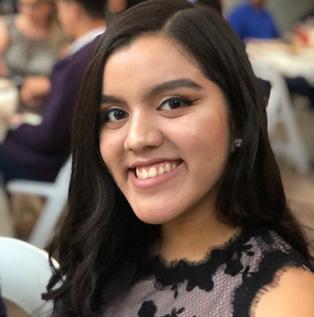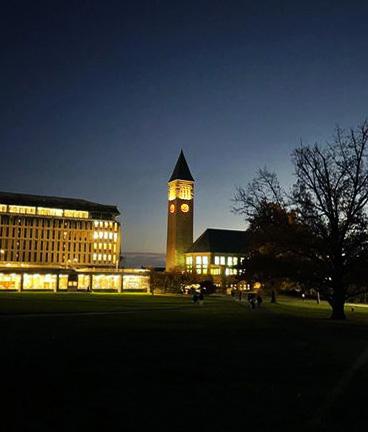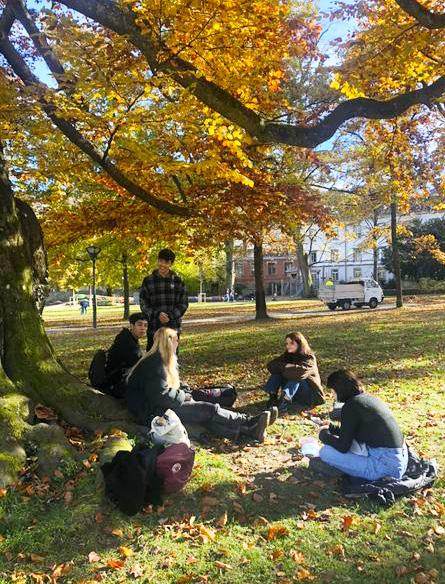CLARITAS
A JOURNAL OF CHRISTIAN THOUGHT
FEATURING
Why Cornell Can’t Love You Down Bad? Good.
The Customer Is Not Always Right


FEATURING
Why Cornell Can’t Love You Down Bad? Good.
The Customer Is Not Always Right

is the Latin word for “clarity,” “vividness,” or “renown.” For us, Claritas represents a life-giving truth that can only be found through God.

Cornell Claritas is a Christian thought journal that reviews ideas and cultural commentary. Launched in the spring semester of 2015, it is written and produced by students attending Cornell University. Cornell Claritas is ecumenical, drawing writers and editors from all denominations around a common creedal vision. Its vision is to articulate and connect the truth of Christ to every person and every study, and it strives to begin conversations that involve faith, reason, and vocation.
If I asked you to give me a definition of love, you would probably respond with something pithy and Cornell-worthy. To will the good of the other. But this would be a bit of a lie, wouldn’t it?
We more likely understand love, for good or bad, in a series of moments. A tender word de-escalating an argument. Apologetic rambling during a breakup. The look in a mother’s eyes. The pangs of loneliness in our dorm rooms.
These moments aren’t translatable, so we resort to cliches in explaining love to one another. Think of all the things we say love is: Blind. A choice. Patient and kind. All you need. Dopamine. A verb. Eternal. Equally applicable to Terrace burritos and your mother.
With this issue of Claritas, we’re hoping to move beyond these cliches to specific perspectives on love: Loving institutions that can’t return the feeling. Loving by noticing our surroundings. Loving customers at Dunkin’ Donuts. But despite their uniqueness, each article, poem, and art piece stems from a central truth, a truth so beautiful that we’ll never grow tired of saying it. God created humanity and then died for its sins, and he did so out of pure love.
If these pages push you even a step closer to understanding that fact, we’ll consider the nagging emails to writers and late-night editing in Rockefeller Hall well worth it. We hope you’ll have a conversation with a friend about what you read. Because although we don’t know exactly who you, the reader, are, we created the Love issue because we love you. And what good is love if it’s not shared?
Love, Jack Kubinec Editor-in-Chief

























 Editor-in-Chief, Editor
Jack Kubinec
Jason Lan Business Manager, Editor
Joaquin Rivera Managing Editor, Contributor, Editor
Jacob Brogdon Production Manager, Editor
Estelle Hooper Design Manager, Editor Blog Manager, Editor
Krystal Ohuabunwa
Debbie Jung Social Media Manager, Designer
David Johnson Contributor, Editor
Annina Bradley Social Media Manager, Contributor, Editor
Alexander Burnett Blog Manager, Editor
Christine Shi Contributor
Raena Prude Contributor
Jesusla Sinfort Contributor
Frank Fang Contributor
Kimberly Valadez Contributor
Dara Gonzalez Contributor Contributor
Katherine Becking
Jennalee Dunn Contributor
Mairead Clas Contributor
Kailyn Liu Contributor
Nate Lo Editor
Joe Dill Editor
Peter Biles Advisor, Editor
Jackie Kim Designer
Michelle Liu Contributor, Designer
Charlie Hill Designer
Ro-Ann Shen Designer
Editor-in-Chief, Editor
Jack Kubinec
Jason Lan Business Manager, Editor
Joaquin Rivera Managing Editor, Contributor, Editor
Jacob Brogdon Production Manager, Editor
Estelle Hooper Design Manager, Editor Blog Manager, Editor
Krystal Ohuabunwa
Debbie Jung Social Media Manager, Designer
David Johnson Contributor, Editor
Annina Bradley Social Media Manager, Contributor, Editor
Alexander Burnett Blog Manager, Editor
Christine Shi Contributor
Raena Prude Contributor
Jesusla Sinfort Contributor
Frank Fang Contributor
Kimberly Valadez Contributor
Dara Gonzalez Contributor Contributor
Katherine Becking
Jennalee Dunn Contributor
Mairead Clas Contributor
Kailyn Liu Contributor
Nate Lo Editor
Joe Dill Editor
Peter Biles Advisor, Editor
Jackie Kim Designer
Michelle Liu Contributor, Designer
Charlie Hill Designer
Ro-Ann Shen Designer
 Joaquin Rivera | trading our disappointment with Cornell for love of our neighbors
Joaquin Rivera | trading our disappointment with Cornell for love of our neighbors
I love Cornell.
No, really. This is a really special hilltop where I have had my best memories, my greatest friends, and my deepest growth. But an interesting question I often ponder is: Does Cornell love me back? Can this institution, with its vast resources, satisfy the craving for love that I and all my fellow students have? Well, you can’t say it hasn’t tried. Vice President Ryan Lombardi bombards me with emails that express how much he appreciates me. Cornell tosses us a few free sweatshirts, free popcorn a few days a week, and a whopping 20 free pages for printing. Generous gifts, sure, but their positive benefit just isn’t quite balanced with the stress I am having about my Labor Law final.
Now, I don’t mean to slander everyone behind these various institutions. I have had great personal interactions with Ryan Lombardi (never got a selfie though). And it makes sense that we want this institution to care for us. After all, it has the distinction of being an Ivy League institution with a massive endowment, and has frequently espoused a commitment to caring for the wellbeing of the community.
[1] However, I think it is vain to look to Cornell for love. Everywhere on campus, I can see signs of despair. An etching on a desk in the Olin Stacks reading “F*** school.” Writing on a chalkboard saying “Why can’t anyone just give me a job?” A Reddit post on r/ Cornell from four months ago states “I was glancing at the reddit’s [sic] of each of the Ivy League schools and there were a lot more panic/existential dread posts on [Cornell’s] IMO.”[2] We want to be valued. We want someone to stand beside us in our trials. Free popcorn in Willard Straight won’t solve that need.
Students have tried to remedy this by turning the lack of love into anger directed at Cornell. A Daily Sun article lambasts Cornell for its misguided approach to new housing. [3] Yet
another describes how Cornell’s athletic infrastructure is not “Ivy League material.”
[4] Obviously, it is a good thing to hold the university accountable, but is there a point to which all this negativity creates more harm than good?
I recently attended a presentation by a senior who talked about the lessons she had learned throughout college. Her primary involvement on campus had been to advocate for more student support, and she had been on the frontline directly speaking to President Martha Pollack and organizing rallies on Ho Plaza. She was proud of the work that she did, but the constant activism burnt her out. In her final months here at Cornell, she found that the best way to help this campus was not to rage at the administration, but simply, to love. She sought to personally help individuals who needed her help. She brought those around her together by hosting meals and other events. So perhaps asking “How can Cornell love us better?” is the wrong question, and we should rather focus on how we can love Cornell better. Isolation, stress for a prelim, and anxiety about our futures grip us all. What if instead of blaming and raging at this institution, we devoted our thoughts to understanding that the person sitting next to us in Human Bonding is also suffering, and just needs love?
In her final months here at Cornell, she found that the best way to help this campus was not to rage at the administration, but simply, to love.
We are not wrong in hoping for help from a larger power. Sometimes we can feel discouraged by the small scale effect of our efforts. We can feel that it is unrealistic to maintain a constant disposition of love. We want to believe in a greater significance behind our actions. And Cornell is not that greater power.
The Bible speaks of a God that understands our struggles and brokenness. He understands that we need more than 20 pages of printing. We need a Savior. It speaks of Jesus, God in flesh, who came down to Earth and helped those around Him. It was prophesied that He would come and save the world, and people thought that this would look like a violent overthrow of the institutions of their day. But that’s not what He did. He loved and ministered to the people around Him. He did not wait for people to love Him before He reciprocated, instead loving everyone first because they were his people. He healed those in society
that no one else wanted to touch. He sat down and ate with those whom everyone else considered unforgivable. He taught a vision of love that was sacrificial, serving, and humble. And most of all, He lived out that vision of life in the most compelling act of love, by being nailed to a cross and dying a slow death, taking our sins with Him.
Now I am not saying that as Cornell students, we should not ever criticize this university. There certainly is a place for those Daily Sun articles that point out the flaws of this institution. Jesus, too, spoke against the leaders of His day. Perhaps most famously, Jesus went into the Temple and overturned the tables of all people who were trying to sell goods there. But this was not the core of Jesus’ ministry. He understood that to bring change, He was to set His eyes on those around Him. And to change their hearts, He poured out His own. This is powerfully demonstrated in Chapters 4-5 of the Gospel of Matthew. Chapter 4 describes the famous Temptation of Christ, in which Satan directly approaches Jesus and tries to win Jesus’ allegiance by offering gifts. One particular offer from Satan is that he will give Jesus dominion over the world only if Jesus bows down to Satan. But Jesus rejects this. Instead, in Chapter 5, Jesus preaches the famous Beatitudes, saying, “Blessed are the poor in spirit, for theirs is the Kingdom of Heaven. Blessed are those who mourn, for they shall be comforted. Blessed are the meek, for they shall inherit the world.” [5] The radical message of Jesus was that we should not be wrapped up in society’s perception of power and what it means to bring change, but that we should see the value in everyone around us, and that true change starts by recognizing that fact.
There is a famous Bible passage that reads “[God] will judge between the nations and will settle disputes for many peoples. They will beat their swords into plowshares and their spears into pruning hooks. Nation will not take up sword against nation, nor will they train for war anymore”. [6] It’s a verse most often interpreted as referring to the
Christian idea of heaven or to the idea that nations should demilitarize and focus more on peaceful development. But I think this verse can powerfully apply to our lives on campus. Except for some crazy clubs on campus like the Historical European Martial Arts club (yes, I am a part of this), we don’t really have the problem of literal swords on campus. But I think we have many instances where we use our resources and talents for more militant or blunt means, rather than for loving those around us. For instance, what if we took all our metaphorical “swords” that we constantly wave at Cornell in the literal form of disparaging speech and articles, and used all that energy to instead attend to the needs of our peers?
For instance, what if we took all our metaphorical “swords” that we constantly wave at Cornell in the literal form of disparaging speech and articles, and used all that energy to instead attend to the needs of our peers?

I’ll admit, when I opened this piece by saying that I loved Cornell, it was a bit of an empty statement. Yes, I can say I love this place for what it has given me, but the Christian way of loving something should extend far beyond that reason alone. In a post by the Cornell Undergraduate Admissions about the “Top Ten Reasons to Choose Cornell”, they tell us that we should love this place because it offers us friends, scenery, professors and alumni. [7] But what if these things fail, is our only option then to hate Cornell? Is it possible to see Cornell in its entirety, beyond the “Top Ten Reasons”, seeing even all the brokenness and faults, and still choose to love it? The 20th century writer G.K. Chesterton in his book Orthodoxy gives a brilliant picture of the significance of loving the institutions we find ourselves in. He talks about the dilapidated London neighborhood of Pimlico, and discusses what it would mean for someone to love Pimlico, writing “Let us suppose we are confronted with a desperate thing—say Pimlico… It is not enough for a man
to disapprove of Pimlico: in that case he will merely cut his throat or move to Chelsea. Nor, certainly, is it enough for a man to approve of Pimlico: for then it will remain Pimlico, which would be awful.” [8] A love of Pimlico cannot be pure pessimism, nor can it be pure acceptance of everything that is going on. One could argue that we are here at Cornell for such a short time, that it may not justify what may be vain efforts to make it better. But Cornell is here permanently, and our actions can change it for the better for all those in the future. We are forever linked to this campus, and not just through LinkedIn. We are forever linked to this campus, and not just through LinkedIn.
Given these connections, what are we to then do? Chesterton goes on, “The only way out of it seems to be for somebody to love Pimlico: to love it with a transcendental tie and without any earthly reason.” Sure, there could be a number of earthly reasons why you might give some love to Cornell. Maybe you are thankful for your professors, the dining halls, or maybe you really are obsessed with the Willard Straight popcorn. But the point is that love should not be transactional. We should seek to give more than we are given. Back when I was a senior in high school and in a frantic search for a place to give money to for the next four years, my eyes were set on Princeton (forgive
me). In my research on Princeton, I came upon a video where current students were being interviewed. One of them was asked something like “What do you think old alumni would think of all the changes that have happened to Princeton?” To which the student replied, “Well, to start, I hope that they don’t think it’s their Princeton anymore. It’s our Princeton.” And while their Princeton never became my Princeton, much to my chagrin on Ivy admission day, I am nevertheless struck by that quote in relation to Chesterston’s message here. Yes, the four years here could potentially be treated as a burden to bear, but why should we not see it as a gift to steward? These four years should not be just another generic period of time where thousands of students simply exist as cogs in a machine. Rather, these four years should be embraced as a unique and vibrant time where a different mix of wonderful people are different from the period before. Thus, we should love this place, because we are here, because it is ours.
love that has been the cause for flourishing cultures, saying, “If men loved Pimlico, arbitrarily, because it is THEIRS, Pimlico might be in a year or two fairer than Florence… This, as a fact, is how cities did grow great… Men did not love Rome because she was great. She was great because they had loved her.” Chesterton mentions the city of Florence, a beautiful city, built on the wealth of great families of the Renaissance. But just because it was great once does not mean that it would necessarily remain that way. People had to be there to love it and nurture what was there. How many other great cities have been lost to time and abandoned? Although not everyone can agree that Cornell as a whole is great, I’m sure everyone has some part of life here that means something. Those things do not just magically remain great, but the task is for us to help maintain what is good about them. And in the same way that we have to love in order to maintain what is great, our love can also remake what is broken. Every action of love, no matter how insignificant it may feel to us, serves to shape the future of the places we inhabit.
And what ties together Chesterton’s argument is that our connection to the places we inhabit is linked to the connection we share with God. Psalm 24:1 reads “The earth is the Lord’s and everything in it, the world and all who live in it.” Cornell is the Lord’s, and we are the Lord’s, so we should honor this place and care for it as we would our fellow brothers and sisters. We ought to love because, and we have the ability to love, because He showed love to us. He gave us the command that we ought to love our neighbors. No qualifications attached. He did not say that we should love if someone acts like this or if we are in a good mood and not busy at the time with a problem set. We are where we are because we are the instruments of God’s plan to show His love and compassion to the world. So how could we waste our time looking down on Cornell with apathy and negativity?
it back. No, we won’t have Daily Sun articles praising or tearing down our individual actions, yet our actions nevertheless have tangible meaning that improves the lives of those around us. Maybe I can’t change how Cornell loves me. But I sure can try to change how I love Cornell and all the wonderful people that I share life with on this little campus on a hill. G.K. Chesterton said that by showing an arbitrary love to Pimlico, it may soon surpass the beauty of Florence. I will end by echoing the sentiment, and contend that if we really try to love this university with a transcendental love, we might actually be the standard for “Ivy League material” one day.
Joaquin Rivera is a sophomore in ILR, but also has a minor in Classics, which everyone says fits his vibe better. He’s from Houston, sorta, because his family moved out over the summer. As Managing Editor, he vigorously tracks the progress of every article, and oddly enjoys doing it. He also loves acting in Shakespeare shows, drinking white chocolate steamers, and telling everyone about Rome.
[1] Lombardi, Ryan. Preparing for February Break, email, 2023
[2] Annual-Pomelo-1508, Reddit, December 17, 2022. ”Which Ivy League has the most stressed students? : r/Cornell (reddit.com)
[3] Brendan Kempff, “What Cornell got Wrong about Housing.” Cornell Daily Sun. February 9, 2022
[4] Brendan Kempff. “We’re not Ivy League Material.” Cornell Daily Sun. March 9, 2023.
[5] Matthew 5:3-5 (NIV)
[6] Isaiah 2:3 (NIV)
[7] Angela Herrera-Canfield, “Top Ten Reasons to Choose Cornell.” Cornell University Undergraduate Admissions Office. March 16, 2015. “Top Ten” Reasons to Choose Cornell | Cornell University Undergraduate Admissions Office
[8] Chesterton, G.K, Orthodoxy, 1908.
Chesterton then finishes the thought by arguing that it is this transcendental
Cornell’s job is not to love me. It can try to please me, and whether it does or not, my mission should be to love

Thus, we should love this place, because we are here, because it is ours.
 Katherine Becking | learning to live with loneliness
Katherine Becking | learning to live with loneliness

When I was growing up, my family moved to a new state about every two years because of my dad’s career in the Army. More often than not, I would start the school year in a brand-new place where I didn’t know anyone. Leaving our old town, old home, and old friends was painful. And in my mind, the only way to overcome my grief was to make new friends. As such, I have spent years of my life trying to get people to like me.
As an introvert, it always took me a long time to develop friendships. In many places we lived, I was lonely until just before we moved away. My junior year of high school was an especially dark time. We had just moved, and my dad had deployed to Afghanistan. In my loneliness, I became numb to everything good in life. Despite my desire to make friends, I was too bitter and exhausted to talk to anyone at school. I felt like I had been left outside to freeze in a blizzard. I would wake up in the middle of the night to eat oatmeal, cry, and yearn for the day that we would live somewhere long enough to put down roots and build lasting relationships.
Weary from hours of studying, we scrawl melodramatic messages on the desks in Olin Library: “Is anyone out there? / To love / To laugh with.”
Indeed, relationships are generally more fulfilling than status and material wealth. An 80-year long Harvard study on aging found that “close relationships, more than money or fame, are what keep people happy throughout their lives.” [2] But often, we take this to the extreme. We treat the people we love as if they can cure all our mortal afflictions.
We treat the people we love as if they can cure all our mortal epitomizes this view. In the song “Cornelia Street”, she describes her relationship with Joe Alwyn as “my religion” (although in another song she admits that maybe “it’s a false god”). [3,4] The couple has since broken up. The idea that we can attain perfect happiness just by finding someone who truly loves us is appealing, but it falls apart in reality.
This holds true in my own experience. Now that I am in college, I have more close friends than my high school self could have imagined. I live in a warm cocoon of community, and most of the time, I am content and grateful. But there are moments (usually when I’ve been awake for too long) when loneliness seeps back into my mind like cold air through my leaky dorm window. I feel left out or worry that my friends are sick of me. I feel like my gifts and personality are underappreciated. No one here really knows who I am.
But there are moments (usually when I’ve been awake for too long) when loneliness seeps back into my mind like cold air through my leaky dorm window.
These feelings reveal an uncomfortable truth: human relationships fall short of providing complete happiness. We are reluctant to admit it because it’s terrifying. Love is the best thing we have in this world, and if other people can’t bring us joy, then what can? Are we cursed to be forever dissatisfied with life?
Actually, yes. As a Christian, I believe that we were created by God, and designed to be in relationship with Him and with other people. But we turned

away from God to seek happiness on our own terms. Separated from the Giver of life and love, we became separated from each other.
The biblical story of the Tower of Babel can be interpreted as a retelling of the fall. In Genesis 11, humanity decides to build a tower to the heavens to “make a name for [them]selves.” [5] God sees their pride and says, “Come, let us go down and there confuse their language, so that they may not understand one another’s speech.” [6] Humanity then abandons the tower and disperses throughout the earth.
This story is generally used to explain the existence of different languages in the world, but it also serves as a metaphor for the emotional isolation of individuals. Because of our rebellion against God, there are barriers of communication between us. We may speak the same language as our friends, but our speech is limited and our understanding is too narrow to comprehend the depths of one another’s hearts.
Furthermore, even if we could fully understand others, we are too selfish to love them unconditionally. Both secular research and the Bible attest to this fundamental issue. One study by Indian researchers found that if given superpowers, people would generally use them for selfish gain rather than to benefit society. [7] Psalm 53 says that “all have become corrupt, there is no one who does good.” [8] Because of our sin and mortality, we can only experience a shadow of the love and community for which we were made. This is why we feel dissatisfied and lonely even when we are surrounded by loved ones.

The evidence of human brokenness is all around us. Some friends cancel lunch plans to do work. Others aren’t there when we need their support. Many Cornellians share Daily Sun writer Vanessa Olguín’s experience of losing touch with high school friends who they were so sure would be in their lives forever. [9] It often feels, as one library graffiti artist states in blue gel pen, that “Love Sucks”. [10]
Fortunately, although human love is fallible and insufficient, God’s love is perfect and fulfilling. He understands us completely because He made us and knows our every thought. God even became one of us as Jesus Christ, experiencing the same emotions that we do. Jesus was chronically misunderstood, and His friends abandoned Him in His darkest hour. He was “despised and rejected by men; a man of sorrows, and acquainted with grief.” [11] No one else could fathom what it was like to be a perfect person in a fallen world. Whatever loneliness we feel, Jesus has felt more, and He can empathize with us.
Furthermore, God’s perfect character allows Him to love us despite knowing us completely. This is naturally hard for us to accept. We tend to think God is as easily repulsed as we are, when in fact He is more gracious than we can imagine. In Isaiah 55, God says that “as the heavens are higher than the earth, so are my ways higher than your ways and my thoughts than your thoughts.” [12] One commentator writes that this passage specifically refers to God’s thoughts being “thoughts of love and compassion that stretch to a degree beyond our mental horizon.” [13] I sometimes worry that if my friends knew me better, they wouldn’t really like me. Regardless of whether that is true, God will never cease to love us even though He sees our worst offenses.
God made us out of love and for love. Our gut instinct that love is the best
thing in the world is true. We just have to remember that it is God’s love, not human love, that has the power to heal and fulfill us. All other loves are mere shadows of His abundant and everlasting grace.

Love from other people can never take the place of God’s love. And unfortunately, in this life, we will always be a little bit lonely. We live in the suspenseful time after Jesus has defeated death but before God has renewed the whole earth. We are not instantly cured of our selfishness and isolation when we put our faith in God. When Christ returns and redeems the whole world, we will be fully healed of our loneliness. But until then, we must live with it.
Surrendering to the inevitability of loneliness may seem depressing, but in fact it is freeing. It allows us to stop seeking fulfillment in human relationships. I have been blessed with a loving family, but their love never felt like enough, so I spent years trying to win the approval of my peers. Yet now that I have several close friends, I am still discontent. I continue to seek validation from ever-widening circles of people. I need everyone to love me, and it’s exhausting. Yet I know that it is futile to chase the approval of others. The great thing about God’s love is that we
don’t have to chase after it. He readily extends it to us.
Additionally, when we realize that human relationships are inherently flawed, we can stop holding those we love to an impossible standard of perfection. For a long time, I have had complicated feelings about my dad. On the one hand, he is gentle, wise, and patient. His life is one of the best pictures of selflessness that I have, and his love as a father reflects God’s fatherly love. On the other hand, my dad’s career in the Army has caused me deep grief and depression by requiring us to move so frequently. I often resent his choice of career, especially since he was a military kid himself and as a teenager swore that he would never inflict this lifestyle on his own family. It is extremely hard to reconcile my dad’s love and goodness with the pain I experienced growing up. In my heart, I know that he is a fallen human, and that I cannot expect him to be perfect. I am gradually building a bridge of forgiveness as I internalize this reality.
There is one more bright side to the fallibility of human relationships: they make grace more visible. There is something beautiful about friendships that persist through disagreement and conflict. My friends disappoint me sometimes, and I have disappointed them, but we still love each other. Our

brokenness is an opportunity for grace and forgiveness to shine. And it is an even greater opportunity for God to reveal His much more abundant grace to the world. This is essentially the reason for everything. God has designed all of human history to tell the story of His love. He created us, let us stray from Him, and redeems us all for His glory. One of my favorite songwriters puts it this way: “Maybe it’s a better thing… To be more than merely innocent / But to be broken, then redeemed by love.”
Katherine Becking is a sophomore studying Civil Engineering. Don’t ask her where she’s from. When she’s not tutoring for math classes, she can be found staring vacantly into the middle distance. She also enjoys painting, mixing concrete, and walking in the arboretum.
[1] Unknown Artist. n.d. Untitled Graffiti. Pencil on wood. Olin Library. Ithaca, New York.
[2] Mineo, Liz. 2023. “Over Nearly 80 Years, Harvard Study Has Been Showing How to Live a Healthy and Happy Life.” Harvard Gazette, April 5, 2023. https://news.harvard.edu/gazette/ story/2017/04/over-nearly-80-years-harvardstudy-has-been-showing-how-to-live-a-healthyand-happy-life/.
[3] Swift, Taylor. “Cornelia Street.” Track 9 on Lover. Republic Records, 2019.
[4] Swift, Taylor. “False God.” Track 13 on Lover. Republic Records, 2019.
[5] Genesis 11:4 (ESV)
As previously mentioned, the window in my dorm room is far from airtight. One morning I woke up with ice on the inside of the glass. But I actually like it. The leaky window reminds me of how cold it is outside and makes me grateful for the warmth that I have from the radiator (and from the curtains which are somehow better insulators than the window). Likewise, I have started to see moments of loneliness as a reminder of the hope I have in Christ. My friends and family can never fill the void in my soul that was meant to be filled by God. But one day, my relationship with God and others will be fully repaired, and I will dwell in the warm house of the Lord with everyone I love.
[6] Genesis 11:7 (ESV)
[7] Das-Friebel, Ahuti, Nikita Wadhwa, Merin Sanil, Hansika Kapoor, and V. Sharanya.
2019. “Investigating Altruism and Selfishness Through the Hypothetical Use of Superpowers.” Journal of Humanistic Psychology, July. https://doi. org/10.1177/0022167817699049.

[8] Psalm 53:3 (NIV)
[9] Olguín, Vanessa. 2022. “Friendships of Proximity.” The Cornell Daily Sun. January 30, 2022. https://cornellsun.com/2022/01/30/olguinfriendships-of-proximity/.
[10] Unknown Artist. n.d. Untitled Graffiti. Pen on wood. Olin Library. Ithaca, New York.
[11] Isaiah 53:3 (ESV)
[12] Isaiah 55:9 (ESV)
[13] Ortlund, Dane C. 2021. Gentle and Lowly. pg 158.
[14] Peterson, Andrew. “Don’t You Want to Thank Someone.” Track 10 on Light for the Lost Boy. Centricity Music, 2012.
I have started to see moments of loneliness as a reminder of the hope I have in Christ.
I am kind of a music freak. If you see me on campus, I’ll have my AirPods in. My Spotify wrapped had almost 100,000 minutes last year. I analyze song lyrics in my free time and have a really bad habit of using them in my English essays (usually not to the amusement of my professors). I need music like I need breathing: I have my songs for crying, songs for laughing, and songs for studying in Uris Library, songs for being in love, songs for running my heart out, songs for dreaming about fantasy worlds, and songs for driving to Target. I am the girl at a concert who is screaming the words with her hands outstretched, as if she’ll somehow be able to communicate to the performer how much the lyrics mean to her—even while she is simply a speck in the crowd, washed out by the stadium lights.
At the New Student Convocation in August of 2019, President Martha E. Pollack delivered a speech discouraging Cornellians from wearing headphones around campus. She warned them that the destructive technology can seal them off from genuine human connection. While the message ultimately alluded to a larger theme of belonging and


exploration here at Cornell, it no doubt stirred a conversation that challenged the normalized practice of wearing headphones, especially for young people. [1] Thirty years ago, it may have been rare for a young person to choose to listen to their favorite song over partaking in a conversation with a friend, but today the popularity of music has soared in prominence— fueled by new streaming platforms, the buzz of social media, and a technologyinducing pandemic. These days, the average Spotify user listens to music for 148 minutes every day, devoting time to 40 artists weekly. [2] Notably, over half of Spotify’s user base is made up of millennials and younger people.
It is no surprise that those most wellversed in technology are readily consuming music at a rate even the meteoric rise in streaming services cannot keep up with. Things have changed, and teenagers find that throwing on a pair of headphones and tuning the world out is a relaxing, enjoyable distraction from the burden of real-life adversity. Music has a distinguished role in adolescent culture: I’m sure we all have at least one friend who badgers us on our opinion on the latest pick for Slope Day, or raves about the release of Taylor Swift’s latest album. It isn’t just the accessibility of streaming services that has created this addictive buzz around music—it is also social media platforms that propel the obsession even further than it could have been decades ago, when teens were burning CDs or jamming out to Billy Joel and Madonna on hi-fi cassette decks.
In other words, it isn’t just about the music anymore. We live in an era where fans can interact with celebrities on an intimate level—not only can they resonate with lyrics or scream their hearts out at the occasional concert, but they can watch comedic interviews on YouTube, connect with the anonymous public through internet fandoms, and
comment on their favorite musician’s Instagram post, eagerly anticipating a reply. Celebrities and popular artists are well aware of the marketing advantage that a veil of authenticity can offer them, and they are more than happy to offer us the candid TikTok video or the sporadic live stream. But for us, it almost feels like we know them personally.
This phenomenon, known as a “parasocial relationship,” described by University of Chicago sociologists Donald Horton and R. Richard Wohl as a “seeming face-to-face relationship between spectator and performer.” [3] This false sense of intimacy is also not always unintentional: Horton and Wohl note that TV personalities and musicians often “use the mode of direct address, talking as if they were conversing personally and privately” with their fans. [3] It is no secret that the overall experience of the consumer benefits from an individualized relationship with the performer: after all, it feels good to feel special. International popstar Taylor Swift’s official Instagram announcement for her “Eras Tour” is tinged with false intimacy as she writes, “I can’t WAIT to see your gorgeous faces out there. It’s been a long time coming.” [4] Yet, the superstar implies that the faces in a stadium of 60,000 people would be visible, and while most fans were at least vaguely aware of the frivolity of the announcement, her warmhearted sentiment no doubt helped sell tickets.
Unfortunately, there is a dark side. Harmless fandoms can quickly turn
It is no secret that the overall experience of the consumer benefits from an individualized relationship with the performer: after all, it feels good to feel special.
into obsessive celebrity cults where fans find themselves debating about the musician rather than the music, feeling passionately that they have a say in a stranger’s private affairs. In this era of false internet intimacy, a change in Swift’s dating life floods tabloids and comment sections, and the sight of any dreamy A-lister in a new paparazzi photo will unleash a host of Buzzfeed articles and frenzied TikTok videos. Superfans feel that they have a right to these normalized invasions of privacy not simply because of the alluring entertainment of celebrity drama, but also because they experience the illusion of a private, face-to-face relationship. Since the fan hysteria of Beatlemania in the early ‘60s, or girls drooling over heartthrobs like Jim Morrison and Roger Daltrey in the ‘80s, the typical superfan has been inflated into something several times more severe. Their love has turned from obsessive to suffocating, from joyous to feverish—to the point where regular strangers are being exalted to a level of idolatry that rivals that of a god.
Their love has turned from obsessive to suffocating, from joyous to feverish—to the point where regular strangers are being exalted to a level of
idolatry that rivals that of a god.
Ultimately, parasocial relationships are what promote our celebrities to such high pedestals. After all, they speak to us through their music, they relate themselves to us, and they treat us like old childhood friends: naturally, it can be easy to forget that the records they make are sold to millions of other people. This leads to the feeling that celebrities are inhuman or omniscient in some way; that they can somehow know us personally while also performing on a worldwide stage. The reality is that no one has that power except God. With God, we are no longer a shout into the void, and a relationship in the parasocial sense is inherently impossible. When we pray, He listens. With a celebrity, we are simply reduced to a nameless speck in a crowd of thousands.
As a Christian, I often see a problem with the extreme devotion to celebrities that much of secular culture tends to ignore. To pour your highest level of admiration into another human (as many superfans do) is to worship an idol, a false god. As God says to the Jews in Exodus 20:2-3,


I am the Lord your God, who brought you out of the land of Egypt, out of the house of slavery. You shall have no other gods before me. [5]
I regularly catch myself placing my obsessions with music or celebrity culture above my faith, and I’m not alone. While it can feel shameful, secular culture is particularly aware of this fervent aspect of the superfan and has completely normalized it, at times cheekily self-aware about the Christian sinfulness of it all (my favorite example is the satirical and infamous religious candle where Jesus’ face is photoshopped and replaced with a portrait of Harry Styles or The Rock. Seriously, search it up—you can find unlimited renditions on Etsy).
The idea of “love” when it comes to celebrity fan culture can be a tricky game. I come across the word all the time while I’m scrolling comment
sections or watching a gushing speech from the Grammys, and I rarely take a moment to contemplate the gravity of it. I’m sure we’ve all been at a concert when some desperate fan screams “I LOVE YOU!” into the gaping silence between sets—their voice painfully echoes, and the performer on stage undoubtedly hears them and offers an uncomfortable nod. Yet, we rarely take a moment to ponder what the word ‘love’ may really mean to a fan who is instinctually screaming it across rows of seats: how can they truly “love” someone they have never met?
The truth is, the person that they are loving is a made-up version of someone that they have contrived, an illusion of perfection. However, love, in the Christian sense, allows for us to see our favorite celebrities as human and love them ever more for it. The Bible is always elevating broken people, and Jesus’ love inherently searches for that brokenness and yearns to make us whole again. Sin is a fundamental element of human existence, so to hold anyone to a standard of perfection is a foolish feat. The apostle Matthew was a tax collector before he was a follower of Jesus, a man who was vehemently hated by the Jews for upholding a profession typically known for being notoriously unjust. [6] The average man would have thought it impossible to reform Matthew, yet Jesus welcomed him with open arms.
In Matthew 5:43-45, Jesus says: You have heard that it was said, “Love your neighbor and hate your enemy.’ But I tell you, love your enemies and pray for those who persecute you, that you may be children of your Father in heaven.”
And in Ephesians 4:32, Be kind to one another, tenderhearted, forgiving one another, as God in Christ forgave you. [8]
At its core, Christian love is defined by forgiveness and is inexhaustible in its nature. Sadly, it struggles to fit into the modern, secularized definition of the word—especially when it comes
to celebrity culture. Social media has made us feel so much closer to the A-listers and internet personalities that we idolize, and the typical love of the superfan tends to deny even the chance that their deity could contain humanlike flaws. What follows is a vicious cycle: Without any means with which to accept the mistakes that our celebrities make (and trust me, they do make mistakes), fan culture can turn ugly and unforgiving. In return, celebrities are forced to cover up any flaw that could risk them getting “canceled” in order to maintain the image of divinity that has been brutally assigned to them.
Celebrities are forced to cover up any flaw that could risk them getting “canceled” in order to maintain the image of divinity that has been brutally assigned to them.
The looming consequence of cancel culture leads to an empty form of love that is inherently un-Christian. The superfan’s love is one born out of idolization, and not many people in the media today do well with the slapping fact that celebrities are sinners. Forgiveness is scarce and ‘loving your enemy’ is an idea seen as even more appalling as fans dig up old tweets and analyze every action with a scrutinizing
eye. For them, a mistake is a deal-breaker, a career-ending factor that they can wield like a weapon. In this way, the media’s infamous superfan— perhaps pictured as a tearyeyed teenage girl begging for Harry Styles to sign her forehead with Sharpie— wields an unlikely power. The superfan’s love can simultaneously create a top hit on the Billboard Hot 100 and catastrophically destroy a career.
Not many people in the media today do well with the slapping fact that celebrities are sinners.
As a young person, I have noticed how the craze around celebrity culture has become a notable facet of the adolescent experience. Teenagers and collegeaged students alike are widely known to show unrivaled displays of devotion to celebrities, and our enthusiasm has made us a target for social media marketing teams and Spotify playlist curators (the teen beats playlist alone has over 2 million likes. Yet, I beg the question: Why is it so easy for us to fall victim to the media’s celebrity delusion and frenzied cancel culture? Perhaps we are searching for guidance, for a way to live our lives with a greater sense of purpose. Perhaps we’re lonely and yearn for more meaningful relationships than those that we share with our peers. Or perhaps President Pollack was right: Our obsession with music has sealed us off from the world, to the extent that the made-up impression of a stranger with over 20 million monthly listeners holds more legitimacy than the relationships in our own lives.
Regardless of the reason, the fervent kind of love that we offer to these distant and glamorized figures will never lead to fulfillment. After all, the pedestal that they stand on is nonetheless a shaky one: With one mistake, we’re typing out hate comments on their Instagram post and boycotting streams. It is
through God alone that we can achieve the closeness that we yearn for—and the acknowledgment of this is the first step to healing our society’s obsessive celebrity cult. God’s glory reaches far and wide, shining on every facet of our lives. Therefore, I propose we redefine what it means to be a superfan as a Christian: to recognize the humanity we all share and love our brothers and sisters in a way that acknowledges flaws. To accept the musician as human and not to fault them for it. When loving becomes forgiving, it becomes boundless, and it becomes infinite—it is the only love we will ever need.
Mairead is a freshman from Connecticut studying English in the college of Arts and Sciences. When she’s not in classes or at track practice, she enjoys reading, writing, making pinterest boards, and listening to way too much music.
[1] Nutt, David. “Students urged to connect and engage – without headphones.” Cornell Chronicle. August 29, 2019.
[2] Nadia. “50+ Statistics Proving Spotify Growth is Soaring.” Siteefy. December 11, 2022.
[3] Donald, Horton. Wohl, Richard. “Mass Communication and Para-Social Interaction.” Department of Sociology, University of Chicago.
[4] Taylor Swift, Instagram. November 1, 2022.


[5] Exodus 20:2-3, ESV.
[6] Denman, Brett. “The Apostle Matthew.” Oregon Live. October 22, 2010.
[7] Matthew 5:43-45, ESV.
[8] Ephesians 4:32, ESV.
It is through God alone that we can achieve the closeness that we yearn for—and the acknowledgment of this is the first step to healing our society’s obsessive celebrity cult.
An anatomical heart is encased in a glass case, guarded by two swords. Two hands reach out from different directions but are blocked by walls surrounding the case.
This piece is inspired by the folk art of Milagros in Mexico, which often depicts hearts being struck by swords or on fire. They are carried as religious tokens of small miracles and represent love and gratitude.

I wanted to present two different meanings to protecting your heart: being protected from the dangers of the world and building barriers which prevent love from entering.
Love is not an easy task. It may be easy to say that you love food, an artist, or time with your loved ones, but letting the love settle in your heart is a long process. Being human means being imperfect and often those who love us, hurt us. While we may forgive, it’s often hard to forget. We guard our hearts against further hurt by not allowing others to love us or love them in return and become cold as we claim we are protecting ourselves.
While hands may reach out to hurt us, they also extend to help. We can guard our hearts from the dangers of the world, but in turn, we may also be depriving ourselves of love. I wanted to reflect on how much we guard our hearts and who we should truly be guarding against. We should allow ourselves to be loved and love others deeply and unconditionally. Although we may experience pain, forgiveness and love will always overcome.
Dara is a sophomore from Laredo, Texas studying English. She enjoys reading more than writing, cultivating playlists for fictional characters, watching animated shows to appease her inner child, making silly Photoshop edits at 3 AM, and learning Kpop choreography.
Dara Gonzalez | 8.5” x 10.5”, acrylic yarn, crochet hook 2.5 mmI wonder if he knows how good his hair looks messed up like that. How I feel when he acknowledges my existence, when he looks at me when we talk. What intrigue and depth of person lies behind those—quick, he’s looking, be cool and mysterious! … Last week I saw him smile to himself at what Sam said from the corner of my eye. I wonder why. He was falling asleep during class today. Maybe he was up late last night… I hope he’ll be at the meeting next week. I just want to be in the same room as him. I could talk to him forever… Agh, I’m so distracted! I shouldn’t be thinking about him this much. But I can’t help myself!
Even though we’ve all probably been down bad before, we might feel embarrassed to have these kinds of thoughts, thinking they’re “of the flesh.” We might even pull out our go-to Bible passage on romance: “The unmarried man is anxious about the things of the Lord, how to please the Lord. But the married man is anxious about worldly things, how to please his wife, and his interests are divided.” [1] Surely distractions like crushes have no place in the mind of someone who wants to give their undivided attention to the Lord.
Is that really what the Bible has to say about romance? That it’s unholy and unproductive? Are we who want to let the Word of God inform our romantic lives destined to just suppress all thoughts and feelings of love or attraction and brute-force our thoughts towards “the things of the Lord?” Pastor Jacob Gerber offers a more nuanced view: “He’s not saying that the married life is unholy, and the unmarried life is not... He’s saying that they are different circumstances, in which all of us are called to pursue holiness.” [2] Taking into view all of Scripture, Paul’s statement is not meant to turn us away from romantic love completely, but to ensure that we are not naïve about the (good) complications of lifelong love in marriage, and that whether married or single, our first desire is to be holy and devoted to the Lord. In another one of his letters, the same Paul that wrote the verses above states that marriage represents the covenantal sacrificial relationship between Christ and The Church, suggesting a high view of marriage and the love it embodies. [3] And if we want to challenge the idea that the Bible dismisses romance as a distraction, there is no better place to look than the Song of Songs.
The book of Song of Songs is an erotic poem (in God’s Holy Word!) that falls under the wisdom literature of the Bible. There is debate about its author, but many attribute it to Solomon, king of Israel circa 960 BCE. [4] There are three main characters: an unnamed young woman, an unnamed young man, and an audience of friends and family, the “daughters of Jerusalem.” The song is all about the love between the betrothed couple, capturing “the joys, insecurities, sorrows, and frustrations

that accompany the journey of love.” [5] And lest we think that it is just an irrelevant side story in the Bible’s Godcentered narrative, Pastor James L. Harvey reminds us that “God is there... superintending it all.” And it’s not just Christians that see Song of Songs as having everything to do with God— Rabbi Akira, one of the greatest Jewish rabbis of the late first century, said that “while all of the sacred writings are holy, the Song of Songs is the holy of holies!” [6]
In chapter 5 of this love poem, the woman’s friends and family ask her, “What is your beloved more than another beloved?” [7] Her response is a poem of praise for her lover:
My beloved is radiant and ruddy, distinguished among ten thousand. His head is the finest gold; his locks are wavy, black as a raven.
His eyes are like doves beside streams of water, bathed in milk, sitting beside a full pool . . .

His lips are like lilies, dripping liquid myrrh . . . [8]
Behold, the “holy of holies” of the sacred writings, going on and on about how beautiful the face of a man is! And this is fairly mild for Song of Songs. After praising her beloved’s facial features, she makes her way downward, visiting every part of his body with vivid imagery. He pours back to her praises of her hair, her lips, her breasts, her naked belly, her hips, the allure of her “garden,” and “at least allusions to the genitalia” (I’ll leave the discovery of those as an exercise for you, dear reader). [9]
So, if this is in the Bible, there must be a good way to delight in our and each other’s physical beauty. Our desires, in themselves, are good and given by God. Just think about it: there’s something so powerful about the way our world changes when we have a crush on someone. We notice them all the time. We dwell on the things they say or do. We dream of being closer to them, and do everything we can to make that dream come true, even at the expense of other
things. Attraction can so effortlessly bring out an attention, adoration, and zeal that no amount of intellect or brute force could ever conjure up.
The woman in Song of Songs knows this very well: “love is strong as death,” she sings. [10] Death is the strongest thing known to man: no one can overcome it. But love is stronger. You may know this power very well, too. But have you ever considered why it is?
The woman tells us, when she goes on to call love “the very flame of the Lord.” Love is a fire, the flame of the Lord. God created love. He is love. [11] That’s precisely why love is so strong: it comes from the very character of our infinitely strong Lord. And because it is from Him, it is also for Him. He alone deserves our worship. Just as a helpful campfire can rage into a devastating forest fire if not contained properly, love is so dangerous and destructive when it is directed away from God, who alone deserves our worship.
Love is a fire, the flame of the Lord. God created love. He is love. That’s precisely why love is so strong: it comes from the very character of our infinitely strong Lord.
Along with all the expressions of longing and delight throughout the Song of
Songs, the woman repeats this warning:
I adjure you, O daughters of Jerusalem, that you not stir up or awaken love before it pleases. [12]
Fully aware of the strength of love, she knows very well that if we get too deep in love too fast, our desire can become bad for us. The New Testament book of James gives greater insight into why this is: “But each person is tempted when he is lured and enticed by his own desire. Then desire when it has conceived gives birth to sin, and sin when it is fully grown brings forth death.” [13]
There’s nothing quite like high school drama to illustrate desire giving birth to sin. In the classic teen comedy Mean Girls, Regina, the mean, manipulative “queen bee” of North Shore High, is dating Aaron, one of the hottest and most popular guys in the school. Naturally, Cady, the new girl, develops a crush on Aaron. In her efforts to win Aaron over and bring Regina down, Cady devises various plots to sabotage Regina, including telling Aaron she was cheating on him. She finally succeeds in breaking Aaron and Regina up, but in the process she fails to obtain what she really wanted, Aaron’s love, because he realizes that she has become just like Regina. Cady’s desires had led to jealousy, betrayal, the destruction of friendships, and the loss of herself.
Furthermore, sin isn’t just negative actions that we do. Thoughts of a person and how they see us can consume our minds and crowd out thoughts of loving those around us, our sense of God, and our sight of important spiritual realities. Our attraction can take hold of us and have authority over our reasoning and actions more than God’s Word (or just common sense!). When this happens, we begin to make compromises, become divided in our loyalties, and ultimately worship someone other than God, which is sin that leads to spiritual death. Even Solomon, the putative author of the very Song of Songs, to whom God gave “wisdom and understanding beyond measure,” beyond “all other men,” was led astray by his wives to worship other gods, causing the downfall of himself and all Israel. [14]
In conclusion, we should eradicate all our desires and commit to celibacy for life… is absolutely not what I am saying.
Martin Luther says, “You cannot prevent the birds from flying in the air over your head, but you can prevent them from building a nest in your hair.” [15] We cannot help but experience attraction and temptation. Although the consequences of unguarded desire are severe, we’ve seen that our desires in themselves can be good. So what do we do when the birds fly over our heads?
Instead of shooting them down, I submit that we should recognize our feelings of attraction as given by God, pray and watch that they do not give rise to sin, and channel them toward the one who created them for Himself.
First, when thoughts of attraction first arrive, our view of attraction as God-given frees us to not immediately repress them but to be curious about them. As we are deliberately, intricately “knitted” together in our wombs by God, [16] what we are attracted to in a person tells us about ourselves, and we can thank God for how He made us and the person we are attracted to. Even better, we can consider how the attractive aspects of a person reflect the perfect character and love of Christ, the “prototype for anything truly admirable you’ve ever admired in anybody.” [17]
Just as a helpful campfire can rage into a devastating forest fire if not contained properly, love is so dangerous and destructive when it is directed away from God, who alone deserves our worship.
For example, mystery. Nothing gets me more than someone who doesn’t feel the need to bare their whole selves to the world. I like to think this is because of how God created me, reserved,

low-key, observant. But if I am drawn towards mystery, I need look no further than my Lord. Consider what Paul says of Him in Romans 11: “Oh, the depth of the riches and wisdom and knowledge of God! How unsearchable are his judgments and how inscrutable his ways!” [18]
Still, we must guard these thoughts carefully, knowing how easily they can bear bad fruits. Martin Luther explains, “We cannot help but suffer attacks [temptations], and even be mired in them, but we pray here that we may not fall into them and be drowned by them.” [19] It may be easy to read this as an exhortation towards self-control. But the word “pray” is key, because it necessarily involves the help and presence of God. Without God, trying to control our desires won’t work. Why would we even want to avoid giving into them? Trying to avoid sin without having a foundational understanding of God’s goodness and sovereignty will, at best, trap us in cycles of repression, guilt, and resentment. But when we turn our hearts to God in prayer, the glory and love of God become bigger in our sight and more weighty in our hearts, giving us greater desire and strength to overcome temptation and not fall into sin. So, preventing our desires from leading to sin is inseparable from turning our desires instead towards God.
This requires admitting that sometimes we are attracted to the wrong things. Sometimes, these things are obviously problematic (e.g., meanness, entitlement, mental illness). Other times, what we most admire is not bad, but it is not what is most beautiful in God’s eyes. In Proverbs, we see that physical beauty is not as praiseworthy as the fear of the Lord, which reflects one’s character and right relationship with God: “Charm is deceitful, and beauty is vain, but a woman who fears the Lord is to be praised.” [20] Let us consider again the woman’s song about her beloved. Although she’s praising her beloved’s body, the deeper meaning within her poetic lines points “not at any extraordinary beauty of [Christ’s] body (...he had no form nor comeliness, Isa. 53:2);
but his divine glory.” [21] What we are attracted to can and should be molded to Christ and the things that make Him glorious. This is not His looks, money, or status (of which He had little), but His character, his sovereignty, and His love for us.
As we pray for the spiritual eyes to see as God sees, God applies his transforming grace to us, changing us and what we love. Coming full circle, loving God first and foremost also changes how we love. Godly love is driven by commitment and patience in God’s timing, not by impatience or volatile feelings. Godly love is not self-centered but seeks to serve the other. With it, we see those we are attracted to for who they are, created and loved by God, with their thoughts, feelings, needs, and wants, not through the lens of how they can satisfy our desires. Rather than spending time with or seeking affirmation from them because of how it makes us feel, it seeks the interests of the other before our own. [22] Pursuing godly love requires us to examine whether our love is based in selfish desires or in the selfless love of God. If it is selfish and objectifying, loving our crush can even mean consciously not pursuing them to keep a risky, off-base infatuation from growing. But insofar as our love comes from and takes after the perfect love of God, let our love abound more and more, leading to abundant joy and fullness of life, to the glory and praise of God. [23]
If it is true that another’s love and desire fuels our own, then Jesus Christ should be the most attractive person of all.
In summary, our thoughts of attraction do not have to keep us from loving God. Just think of the strength of attraction expressed in Song of Songs, which beautifully captures how we love as humans, and ultimately how Jesus loves us. Our attraction, with the vitality of the desires they conjure, can actually fuel our love for Him and love for others.
Lastly, there is a component of
attraction that goes beyond someone’s appearance or personality. It seems to be a fundamental law that we are more attracted to people when they show attraction or care for us.
If it is true that another’s love and desire fuels our own, then Jesus Christ should be the most attractive person of all. While we showed no interest in or love towards Him, Jesus loves us with the strongest love, the love that the woman in the Song of Songs sings of, “strong as death”. In His love, Christ died for us to save us from the rightful wrath of God, because that’s how much He wants us to be in a relationship with Him. So let’s look upon Jesus, our beautiful Savior. Let’s love Him “because He first loved us.” [24] Let’s say together with the woman in Song of Songs, to our beloved Jesus and anyone who will listen, “This is my beloved and this is my friend.” [25]
Christine Shi is a senior from Boston, MA. Don’t ask her what she studied. But do talk to her about who you are, what you love, what’s been perplexing or troubling you! She derives joy and fulfillment from swimming and gymnastics, music, having real conversations, and simple, earnest service.
[1] 1 Corinthians 7:32-34 (ESV)
[2] Gerber, Jacob. “‘Undivided Devotion to the Lord’ (1 Corinthians 7:32–40).”
Harvest Community Church (PCA), October 27, 2019. https://harvestpca.org/sermons/ sermon-undivided-devotion-to-the-lord-1corinthians-732-40/.
[3] Ephesians 5:22-32
[4] “TGC Course: Introduction to Song of Solomon.” The Gospel Coalition. Accessed April 30, 2023. https://www.thegospelcoalition. org/course/song-of-solomon/.
[5] Harvey, James L. “Why Study the Book of Song of Solomon?” Crossway, June 8, 2018. https://www.crossway.org/articles/why-study-thebook-of-song-of-solomon/.
[6] Mishnah Yadayim 3:5
[7] Song of Songs 5:9
[8] Song of Songs 5:10-13
[9] Shanks, Andrew. “What’s the Difference between Erotica and Song of Solomon?”
The Gospel Coalition, May 15, 2013. https:// www.thegospelcoalition.org/article/whatsthe-difference-between-erotica-and-song-ofsolomon/.
[10] Song of Songs 8:6
[11] 1 John 4
[12] Song of Songs 8:4
[13] James 1:14-15
[14] 1 Kings 4:29-31
[15] Luther, Martin. Martin Luther’s Small and Large Catechisms. Saint Louis: Concordia Publishing House, 2019.
[16] Psalm 139:13
[17] Ben Hutton, “Made His Own” (message to Cru Cornell, Cornell University, Ithaca, NY, April 21, 2023).
[18] Romans 11:33
[19] Tappert, T. G. The Book of Concord: The Confessions of the Evangelical Lutheran Church. Philadelphia, PA: Fortress Press, 1959.
[20] Proverbs 31:30
[21] Henry, Matthew. 1706. Matthew Henry Commentary on the Whole Bible (Complete). Vol. 1. N.p. https://www.biblegateway.com/ resources/matthew-henry/Song.5.9-Song.5.16.
[22] Philippians 2:3-4
[23] Philippians 1:9-11
[24] 1 John 4:19
[25] Song of Songs 5:16
We weren’t perfect You know, I’ll admit it Yet, somehow, we were always smiling Always holding each other in prayer
Together, I spent many of my firsts: My first birthday, my first concert
My first beach trips, and my first graduation
But then, that all came crashing down
At the end of a twelve hour shift
During a car ride ‘crosstown
And I don’t believe it, I can’t Your silence pierces my ears Your actions cloud my mind
I’m nauseous just trying to find a way out
But then I saw your car drive by And you didn’t stop
So I thought, can I be the one who is wrong?
I talk to myself, time and time again
And still, nothing makes sense
But it happened, what shouldn’t have happened
So I no longer expect anything from you For my patience for you has run out And my mind borders on insanity
Yet, in the confusion, I wonder
I wonder if I ever truly meant something to you
If I ever meant what you led me to believe And if so, why you hurt me this way?
I followed your words without objections All I ever did was for our sake, its true And never had I doubted your directions I guess I truly loved you
Yet, the little voice in my head was right When it warned against you That you would only be a mistake But I believed you were the exception And turns out, you are worse than that
You’re convinced this between us love, but it isn’t Your words were full of selfish commands and no understanding But I didn’t notice
I didn’t notice the meaning behind your surprise coffee Sunday mornings, Didn’t notice the timeliness of your more frequent visits, Or of your sudden disappearances And now, of your unannounced questions
I’m determined to move on, but it seems you aren’t but don’t worry If you don’t know, I can teach you
I erased our pictures, threw away your gifts Stopped reading my Bible, and threw away our notes Deleted our songs, and threw away our movies Erasing every trace of you
Because after all, it was right The voice in my head
When it said that you would only be a mistake
I wonder what has become of you I heard it’s not working, you and your new love How funny
My arms froze when you ran to theirs It wasn’t until then that I understood what role I played That we only loved each other when it fit best
Even though I still wish to forget you Truthfully, I haven’t
The memories are very much alive
I hate the songs we used to sing I hate your reassuring I love you’s I hate your gentle eyes and soothing voice But that isn’t what I hate the most
I hate how badly you define love
I hate that you only drove by and never dared to say goodbye
I hate that your memories still haunt my present But what I hate the most is that I don’t hate you
I never thought it possible That I’ll become hollow
That I’ll despise the things I once loved Nor that this would be thanks to you
I don’t like to hate, it’s exhausting But you’ve earned it and force me And yet, what I hate the most is that I don’t hate you Even now, I love you, although differently If I didn’t, I wouldn’t be here And if I put up with you, it’s because at times I was happy too
I love the firsts we shared I love you even if you didn’t say goodbye And I love that you still ask for me Sunday nights
Isn’t it funny, though? How you now come to me And you come with your heart in pieces
It could have been me
Who still cared for your heart
But you cruelly turned away And stabbed mine
Don’t get me wrong, we’ll never be the family we were We can only cherish it
Yet, in the midst of all, I am left with one disgrace: To miss what didn’t happen And like an idiot, I still do


When I first arrived at Cornell for freshman move-in, I remember being struck by my dorm’s floor-to-ceiling windows and motion sensing light fixtures. The paint still smelled fresh.
I was one of the lucky ones, I thought— assigned to a brand new dorm. The North Campus Residential Expansion was finally complete, ready to welcome the class of ’26 and to foster a “cohesive community.” [1] My neighbors would be from all over the world. I was ecstatic.
While I unpacked, my suitemate Emily* knocked on my door to introduce herself. Her roommate Angie* followed, clad in Cornell gear and a sincere smile. Standing on the patch of patterned carpet between our half decorated rooms, we excitedly shared our hometowns and majors—answering all the typical orientation week questions.
Yet, following our first interaction, a blurry whirlwind ensued. In the busyness of determining the fastest walk to Morrison, donning shower shoes, reading syllabi, and learning the ropes of the TCAT bus system, I ceased to see Emily and Angie, save for the occasional moments we’d cross paths, extending small smiles.
As time passed and sunsets came sooner, we slipped into an awkward two-step. Encountering each other in our hotel-like hallway, we’d pull out our phones to avoid eye contact. At night, we’d brush our teeth standing next to each other in heavy silence. It became our convention.
But Social Isolation,” an article from The Cornell Sun headlined in the fall. [2] When I reflected on my own freshman dorm experience, this statement didn’t feel too disparate from reality. Residents kept their doors closed. My relationship with my suitemates—a once promising flame—had extinguished.
I knew it was my responsibility in part. But I was busy. During my first weeks at Cornell, I reveled in the newfound freedom of building my schedule entirely around myself, color coding squares of time onto my Google Calendar.
Cornell’s ecosystem is uniquely designed for ambitious students: Convention on campus is to accomplish great things for our respective selves. We pack our schedules full of boxes to check off. Yet, in our culture of self-ambition, saturated with the words “self improvement” and “self realization,” we must not miss the very word of God. The second greatest commandment—which follows only loving God with all of our hearts, souls, minds, and strength—reads:
“Love your neighbor as yourself.”
[3] It echoes. “As yourself.” This commandment is meant to set the foundation for how we live. Through orienting ourselves towards it and the first, all other subsequent commandments are fulfilled. So often, however, I race through my day, never taking in the myriad faces of Cornell, never wondering how I can better love each one. I extend apathy to the residents in my dorm—my physical neighbors.
I reveled in the newfound freedom of building my schedule entirely around myself, color coding squares of time onto my Google Calendar.
The Gospel of Luke recounts a man well acquainted with Jewish law asking Jesus, “And who is my neighbor?” Jesus replies by sharing the Parable of the Good Samaritan:
During a time of strong hostility between the Israelites and the Samaritans—two neighboring tribes animus toward each other because of religious difference— an Israelite fell among robbers along his
journey from Jerusalem to Jericho. He was stripped, beaten, and left half dead. While he lay wounded, a priest and a
Levite walked along the road without stopping, denying aid to their fellow Israelite. Only did a Samaritan, the expected enemy, have compassion. He bound up the man’s wounds, poured out his expensive oils and wine, and carried the man to an inn on his own donkey.

This Samaritan, who reached across lines of social class, religious division, and deep-seated antipathy to demonstrate unexpected love and mercy, proved to be a neighbor, Jesus revealed. [4]
I, on the other hand, realized I had not.
Jesus described in the story of the Good Samaritan.
Repeatedly throughout the Bible, God characterizes love as a radical departure from expectation. In the Gospel of John, Jesus is depicted washing His disciples’ feet. The all-powerful Creator lowers Himself to His knees. A humble God is almost paradoxical. Understandably confused, Simon Peter, one of Jesus’ disciples asks, “Lord, are you going to wash my feet?” Jesus replies, “You do not realize now what I am doing, but later you will understand.” [5]
Today, with the image of Christ’s broken body on the cross, we can understand. The love God lavishes on us is nothing we could ever earn or afford. Yet He humbled Himself to take on human flesh, exemplifying a servant’s love for the sake of our salvation. [6] In our broken nature, we need Him to wash our feet to enter a relationship with Him and be freed from our bondage to sin.
True neighborly love, as it’s biblically characterized, transcends a doormat inscribed “Welcome!” It surpasses Mr. Rogers’ neighborly friendliness [7]. It breaks with convention. The Good Samaritan, who would have been expected to revel in the beaten Israelite’s brokenness, had compassion. When God washes His disciples’ feet, He stumps Peter, one of His closest followers. This picture of love, as God paints it, should serve as a stark example for how we ought to live today.

True neighborly love, as it’s biblically characterized, transcends a doormat inscribed “Welcome!”
to my suitemates about grabbing a meal together. Sitting beneath Appel’s warm ceiling light, slices of sheet pizza between us, my roommate and I conversed with Emily and Angie for the first time in months. Our talk was small, but refreshing. A minor shift occurred. When we returned to our dorm, our subsequent interactions were characterized by rekindled friendship.
Today, on a larger scale, relationships seek rectification. The faces we might pass on our rush to class long to be seen. Cornell’s 2021 Undergraduate Experience Survey reports 22.9% of respondents disagreeing with the statement “I’ve found a community where I feel I belong.” [8] Furthermore, Gen. Z is described as the “loneliest generation.” A survey from Cigna reports individuals aged 18-22 scoring high on the UCLA loneliness scale. [9] Initiatives on campus like Anabel’s Grocery and the Basic Needs Coalition care for our immediate neighbors with essentials such as food, housing, health, and finances. [10] Yet, despite these inspiring initiatives, a deeper need remains. Loneliness is still experienced in crowded rooms; brokenness still hides behind closed doors. With such need, it merits asking: Are you loving like the Good Samaritan?
The faces we might pass on our rush to class long to be seen.
Beyond neglecting friendships with those in my dorm, I had watched sour cream slip off my plate at Okenshields, leaving the task of cleaning it up for the dining hall staff. I’d sped past acquaintances on my walk to class without saying, “Hi.” My way of loving was far from the extraordinary love
My shiny new dorm had become a place for little more than switching off my bedroom light within good comfort. It seemed acceptable. I could go a whole semester not once conversing with my suitemates. But it no longer sat right with me.
Freshly convicted, I stepped outside of my own comfort and reached out
C.S Lewis writes “To love at all is to be vulnerable.” [11] Slowing down to strike up a conversation with a dining hall employee might require initial discomfort. Loving is not always easy or free. It may come at the expense of a shattered heart. But in experiencing the abundance of God’s inconceivable love, what overflows empowers us to love unabashedly. This bold love can bring to life what was dormant, like Ho Plaza’s cherry blossoms in springtime. It can reignite flickering flames of friendship.
If we are to truly love our neighbors as
ourselves, we are to love across social barriers, outside of expectation, and beyond what is often convenient— clearing our calendars for a hurting friend, breaching silence with a kindhearted “hello,” and not taking acquaintances for granted, whatever barriers in our way.
*=Pseudonyms
[1] “The North Campus Residential Expansion.” Student and Campus Life, n.d. https://ncre. cornell.edu/.
[2] “Similar to Last Year, New North Campus Dorms Provide Luxury But Social Isolation” The Cornell Sun, 2022
[3] Mark 12:30-31 NIV
[4] Luke 10:25-37 ESV
[5] John 13:3-8 NIV
[6] John 3:16 ESV
[7] “Won’t You Be My Neighbor?” Song Lyrics, Fred Rogers, 1967
[8] 2021 Cornell Undergraduate Experience Survey, pg. 142
[9] 2018 Cigna U.S Survey of 20,000 Americans on loneliness
[10] Basic Needs Coalition / Anabel’s Grocery Website

[11] C.S. Lewis, The Four Loves, 1960
Annina is a first-year studying Government and French from Boise, ID. Any time you might find her audibly obsessing over spring foliage, reviewing food, making aesthetic Spotify playlists, or studying outside if it’s above freezing. She also commonly publicizes that Idaho is more than just the potato state.
In experiencing the abundance of God’s inconceivable love, what overflows empowers us to love unabashedly.
 Michelle Liu
Michelle Liu

flew to another city to win over a crush of mine. One week and $300 later, I flew home in the friend zone, lamenting my decisions and rethinking my life. My mind flashed to Paul’s admonition in 1 Corinthians: “Now to the unmarried and the widows I say: It is good for them to stay unmarried, as I do. But if they cannot control themselves, they should marry, for it is better to marry than to burn with passion.” [1] Perhaps, it would be better for me to stay single forever, like Paul. I would save so much time and heartache. I could have donated that $300 to a charity or my church instead of indulging in a fruitless romantic pursuit. When I went to my dad with my heartbreaking news, he had the nerve to rub salt in my open wound by proposing that he arrange a marriage for me (because even he could see that I was hopeless).
He might have had a point. Wouldn’t it be easier if my parents just chose someone for me? Since I clearly “burn with passion,” it would be a win-win! During my era of singleness, I could harness my burning passion toward a more productive avenue, such as my
facts about arranged marriages. I couldn’t find any statistics on the rate of arranged marriages in America, but I found that a staggering 40-50% of marriages in the US end in divorce. By contrast, 55% of marriages around the globe today are still arranged, with only 6.3% ending in divorce. [3] In fact, arranged marriages have been the norm for most of human history. According to the HuffPost, love only became a primary reason for marriage in the 18th and 19th centuries when Enlightenment thinkers began promoting the “right to personal happiness.” [4]
Now, I want to clarify that I am not actually advocating a cultural shift back to arranged marriages. I would rather die single than allow my father to choose a woman for me. And, there are plenty of valid arguments against arranged marriages. For example, arranged marriages are most prevalent in cultures where women do not have as much autonomy. I am also speaking out of a place of singleness, so I have no credibility (and I don’t actually have a Hinge profile). However, I perceive that mainstream marriage and (in particular)
of your day to mindlessly swipe through people. If you match with someone, you enter a low-risk “getting to know you” stage. If that goes well, you’ll start dating more formally or maybe hooking up. But if, at any point, the other person does something that displeases you, you can just drop them! There are plenty of fish in the (Big Red) sea anyways, especially with the unlimited catalog of people on Tinder or Christian Mingle.
This model of relationships reflects an individualistic culture centered on self-gratification. It grants people the entitlement to freely cast others off since there is an endless supply of better and more attractive people to invest in (similar to the entitlement that the admissions officers feel when they cast 91% of Cornell applicants into the void). However, in the name of love, out of free will, we have actually dehumanized people. We think of them as potential merchandise in a marketplace of “love” made easy and convenient by the multibillion-dollar dating industry. With all its ills, arranged marriages see people as people, embedded in families and social contexts. Dating profiles depict
someone’s son or daughter, not just an object or a collection of photos.

With all its ills, arranged marriages see people as people, embedded in families and social contexts. Dating profiles depict someone’s son or daughter, not just an object or a collection of photos.
Ironically, there is also an arrangedmarriage-like element of modern dating culture that still defers responsibility for finding a mate to someone else. Cornell’s Perfect Match [5] is literally arranged dating, but instead of trusting the judgment of the parents who raised you, you entrust your fate to some sophomore Computer Science major juiced up on Celsius and parental expectations who only knows your height, zodiac sign, and favorite hook-up song. Cornell even has something called the “Cornell Marriage Pact,” where you can take a quiz for an algorithm to arrange a marriage pact for you. [6]
In arranged marriages, you lose this ability to move from relationship to relationship freely. You’re kind of just matched with someone and stuck with them. You meet a person where they are and build a life together. There are also generally more factors than just love involved in an arranged marriage, such as familial influences. Maybe your family found you this person to marry because it would honor the family name, or there is some political reason for your marriage. While these are not necessarily the cleanest intentions, this relationship that you’re put into is for something bigger than just the two of you. There’s no expectation that this person will satisfy your personal pursuit of joy. Instead, marriages persist because of selfless love.
One of my favorite plays growing up was Fiddler on the Roof (because I was a strange little boy that was fascinated with sorrow and Jewish music). This musical is mainly about cultural change between two generations, which gets explored in a subplot where the father, Tevye, tries to arrange a marriage for his daughter,
Hodel, who has subscribed to a new cultural norm of falling in love before getting married. This tension causes Tevye to contemplate his arranged marriage with his wife, Golde. A conversation between these two unfolds in a musical number entitled “Do You Love Me?” in which Tevye persistently asks this question to his wife. Golde first responds by listing the duties that she’s completed for her husband.
Do I love you? For twenty-five years I’ve washed your clothes
Cooked your meals, cleaned your house Given you children, milked the cow After twenty-five years, why talk about love right now?”
Tevye again asks the question, and Golde concludes that her service and life with Tevye are enough to warrant love.
“Do I love him?
For twenty-five years I’ve lived with him
Fought him, starved with him
Twenty-five years my bed is his
If that’s not love, what is?”
The song ends with Golde’s realization that:
“It doesn’t change a thing
But even so After twenty-five years
It’s nice to know.”
“Do You Love Me?” paints a beautiful picture of a selfless marriage. Over twentyfive years, Golde devotes her time, livelihood, energy, and life to a man she met for the first time on her wedding day. She even suffers with and for Tevye by giving him children, enduring fights with him, and starving with him. These
two individuals were mutually selfsacrificial through a difficult twenty-five years, all within a culture and tradition of marriage that we claim was not “founded on love.” [7]
Multiple marriage stories in the Bible also seem to favor arranged marriages. The first “marriage” in Genesis is arranged. Adam does not choose Eve out of love, or vice versa, but rather, the Father places Eve into the life of Adam [8]. There are several other examples of successful arranged marriages in the Bible, most notably the faithful and God-ordained union of Isaac and Rebekah. [9]
In contrast, marriages that result from passion and self-serving interests in the Bible are messier and often enmeshed in polygamy. Out of love for Rachel, Jacob works for 14 years to earn her from
addition to those that led them away from the will of God, which suggests that any satisfaction those marriages provided did not satisfy their passions long-term.
The fleeting satisfaction of romantic relationships is a well-studied phenomenon. According to Lucy Brown, professor of neurology at Einstein College of Medicine in New York, the attraction between romantic partners, defined as the “Early Attachment Stage,” only lasts about five years. Afterward, married couples enter the “Crisis Stage,” which makes or breaks relationships. [13] Perhaps, David and Solomon tried to resolve their “crisis stage” by simply obtaining more wives.
Thus, statistics and the Bible both suggest that arranged marriages are more successful than marriages out of attachment and attraction. If the Enlightenment idea of a “right to personal happiness” is the foundation of a romantic relationship, it seems fated that both parties will struggle to pivot and embody a selfless love like Tevye and Golde’s when the relationship enters the “crisis stage.”
If the Enlightenment idea of a “right to personal happiness” is the foundation of a romantic relationship, it seems fated that both parties will struggle to pivot and embody a selfless love like Tevye and Golde’s when the relationship enters the “crisis stage.”
The balance point between the freedom of romantic marriages and the endurance of arranged marriages is perfectly captured by the Greek word for love, Agape, which means selflessly loving someone. [14] Paul uses this word in Ephesians 5:25 to describe selfless love in marriage. Agape is the same word used to describe God’s selfless and perfect love for us. “Husbands, love (Agape) your wives, just as Christ also loved (Agape) the church and gave Himself for it.” [15] This love is not
Eros, the greek word describing the romantic and sexual passion we might instinctively associate with dating relationships. Our relationships and marriages are not necessarily about the happiness and gratification we temporarily feel, though that may be a positive byproduct. Instead, we are meant to joyfully sacrifice ourselves and our will for the one God has placed in our lives.
Despite everything I’ve said in this article, I do not think it is practical or even desirable for our individualistic culture to try and resurrect arranged marriages. After all, 50-60% of people in America do stay successfully married until death after choosing their spouse themselves. I also want to reiterate that I would never want my dad to arrange my marriage! However, there is something to be learned about the statistical success and the model of sacrifice that arranged marriages depict.
Arranged marriages depict giving up your desires for the sake of someone else and for factors greater than your own desires. Marriage is supposed to represent Christ and the Church, and Jesus suffered and died for the church out of Agape love. [16] In contrast, the modern pursuit of romance is flighty and entitled to endless options. We seek personal gratification, and as soon as that feeling is lost, we have the option of divorce. How would we approach marriage (and analogously, dating) if there just wasn’t an option to do that? In the Bible, the only two conditions for divorce are sexual immorality and abandonment by an unbeliever, and wedding vows are often capped off with “until death do us part.” [17, 18] There is permanence here. What if we considered the idea that there is a greater purpose to our relationship than just trying to find someone who will satisfy our fleeting desires? What if we were to remember the permanence of a Godly ordained marriage? What if we recognized that each “fish in the sea” is a person created in the image of God?
Arranged marriages depict giving up your desires for the sake of someone else and for factors greater than your own desires.
Marriage is a representation of God and the church. It is a blessing to us that we can use our relationships for the extraordinary purpose of glorifying the one who controls it all, including our relational outcomes. Even if our culture does not arrange marriages, in our modern pursuit of romance, we should adopt a posture of selflessness and selfsacrifice.
Frank Fang is a freshman studying Biological Engineering (What is that? He doesn’t know either!) from Abilene, TX, home of the Abilene Christian University Wildcats (scratch ‘em till the day I die!) Frank is known for his unceasing devotion to Abilene Christian University and the fact that he plays the cello. In Frank’s free time, you can find him bitterly arguing with Joaquin Rivera and Jack Kubinec about his future with Claritas because he hates his editors. Frank would like you to know that they cancelled three of his articles before this draft, which he cranked out with bitterness, anger, and hatred in his heart.
[1] Corinthians 7:9 NIV
[2] Zuckerman, written by Arthur. “56 Marriage Statistics: 2020/2021 Global Data, Analysis & Trends.” CompareCamp. com, February 12, 2021. https://comparecamp.com/marriagestatistics/#TOC4.
[3] “Divorce and Child Custody.” American Psychological Association. American Psychological Association. Accessed April 29, 2023. https://www.apa.org/topics/divorce-child-custody.
[4] Tribune, 2014 Salt Lake. “Marriage: What’s Love Got to Do with It?” HuffPost HuffPost, February 14, 2014. https://www. huffpost.com/entry/love-marriage-history_n_4774740
[5] “Let’s Find Your Perfect Match!” Perfect Match. Accessed April 29, 2023. https://perfectmatch.ai/.
[6] Cornell Marriage Pact. Accessed April 29, 2023. https:// cornell.marriagepact.com/.
[7] “Fiddler on the Roof.” Music by Jerry Bock, lyrics by Sheldon Harnick, book by Joseph Stein.
[8] Genesis 2 NIV
[9] Genesis 24 NIV
[10] Genesis 29 NIV
[11] 2 Samuel 11 NIV
[12] 1 Kings 11 NIV
[13] Allison Abrams, LCSW-R. “Navigating the 4 Stages of a Relationship.” Verywell Mind. Verywell Mind, January 6, 2023. https://www.verywellmind.com/the-four-stages-ofrelationships-4163472
[14] Kennedy, Katie T. “What Does the Bible Say about Arranged Marriages?” Crosswalk.com. Crosswalk.com, June 29, 2022. https://www.crosswalk.com/family/marriage/what-doesthe-bible-say-about-arranged-marriages.html.
[15] Ephesians 5:25 NIV
[16] Ephesians 5:21 NIV
[17] Matthew 5:32, 19:9 NIV
[18] 1 Corinthians 7:15 NIV
Jesusla Sinfort | why God’s love is constant through suffering and joy
This year, Cornell Perfect Match—a student-designed matchmaking survey— received over 4,500 submissions. [1] Survey respondents were asked a range of questions from “the worst thing a match could wear to a date” to whether or not the match’s personality being compatible was essential. Cornellians want romance. Thousands of us place hope in algorithms to find the perfect partner.
However, our perceptions of love are unreliable because our romantic love framework generally tells a story of a transactional relationship. [2] In order to receive the feel-good love that we desire, we need to live up to the world’s ever-changing standards for deserving love. And unfortunately, as we strive to understand God’s transcendent nature, we often force God’s love into our restricting framework for romantic love. However, God’s love transcends every love narrative that we use to navigate our relationships with others. His love is not conditional on whether we meet certain physical, personality, or even character standards, nor will it always induce the feel-good situations in our lives. What does it mean for God to love us personally?


Unlike deities in other religions, God loves us in spite of our shortcomings
because “God is love”—a phrase that declares the essence of God. It has its roots in John 3:16: “God so loved the world that he gave his one and only Son, that whoever believes in him shall not perish, but have everlasting life.” [3] This verse articulates the greatest act of love—God taking on human flesh by sending His son, Jesus Christ, to die on a cross as an atonement for our sins. [4] God freely offers the gift of eternal life to everyone because of His unconditional love for us.
God’s love for the world is not only all-embracing but profoundly individualized. Indeed, my favorite moments in life are when the overflow of God’s love for me manifests as gifts of opportunity. Sociological research shows that “evaluations (feelings) of “goodness” and “badness” plays a defining role in shaping our perceptions.” [3] This is how we think about romantic partners: If we enjoy being with them, we must be in love. Therefore, the feel-good moments in our lives that mark the loving hand of God help us feel God’s love as personal, and not solely love received by virtue of our membership in mankind.
Therefore, the feel-good moments in our lives that mark
the loving hand of God help us feel God’s love as personal, and not solely love received by virtue of our membership in mankind.
It follows that moments of badness tend to cloud our perceptions of God’s love for us. As a transfer sophomore entering Cornell, I struggled with adapting to a challenging collegiate environment that didn’t feel the most inclusive while trying to find community in a secular arena. I sprained my left ankle within the first few weeks of my first semester, which made adjusting to my new environment even more difficult. I still remember the piercing pain that restricted my day-to-day activities and lingered for weeks. In that season, I struggled to feel loved by God due to classifying my physically and emotionally strenuous challenges as a bad thing. Fortunately, leaning into the truth of God’s love for me reconciled the cognitive dissonance between knowing that God loves the world and feeling that God does not love me personally.
The biblical story of Job illustrates the complexity of God’s love, and reminds us not to perceive God’s love through the paradigm of our situations. Job was a wealthy, prosperous and God-fearing
man who lost his earthly possessions, friends, children and lastly, his health. The intensity of his suffering led him to question whether not being born would’ve been better than enduring so much pain. If we solely associate feelgood moments with God’s love, Job’s sufferings appear to suggest that God does not love Job. However, nothing transpired outside of God’s sovereign control over and love for Job’s life. God poses pointed questions to Job about the creation and control of the Universe to remind Job of His ultimate control over everything. His questions included broad questions about the universe. “Where were you when I laid the foundation of the earth? Who marked off its dimensions?... Have the gates of death been shown to you? Have you seen the gates of the deepest darkness? Have you comprehended the vast expanses of the earth?” God also included more specific questions to illustrate that He is God of the small things too. “Can you bring forth the constellations in their seasons or lead out the Bear with its cubs? Do you know the laws of the heavens? Do you send the lightning bolts on their way?” [5]
It consoles Job that he could not respond with a yes to these questions because it compelled him to trust God. In praising God he asserted, “Naked I came from my mother’s womb, and naked I will depart. The Lord gave and the Lord has taken away; may the name of the Lord be praised.” [6] Despite all of Job’s suffering, he did not curse God because he trusted in God’s love for
him. At the end, God showers Job with blessings by restoring all that he lost several folds.


The story of Job not only reveals God’s restoration power but His sovereignty over both the suffering in Job’s lives and the feel-good ending. Whether God restored all the material possessions that Job previously enjoyed has no bearing on God’s love because it is unchanging. Likewise, the sufferings we experience should not have any bearing on how we understand God’s love. For the absence or presence of dark seasons in our lives does not correlate with the absence or presence of God’s love. Before God created us, He loved us. [7] And this reality, coupled with the unchanging character of God, means that nothing can alter God’s love for us. Therefore, our life circumstances are not accurate determinants of God’s love. We are assured of God’s unchanging love in Romans: “Nothing can separate us from the love of God, neither death, nor life, nor angels, nor principalities, nor powers, nor things present, nor things to come can separate us from the love of God, which is in Christ Jesus our Lord.” [8] Therefore, Job did not wrestle with his sufferings alone because even his sufferings were limited by the sovereign love of God.
We also benefit from a consciousness of being personally loved by God for reasons perhaps beyond our expectations: There are health benefits to feeling loved by God. Jeff Levin, a researcher at Baylor University, carried out a clinical study to assess the implications of “religious love,” defined by the feeling of loving and being loved by God. He found a statistically significant association between a loving relationship with God and positive self-ratings of health. [8] This association withstood controlling for the effects of several hypothesizing mediating factors. Among his many hypothesized reasons, Levin theorized that an intimate relationship with God brings people divine blessings, such as improved health. He notes that this supernatural influence would be hard to measure scientifically. Nevertheless, his research shows that loving and being loved by God exerts a positive influence on perceptions of health, exemplifying practical benefits to living under the consciousness that you are loved by God.
They found that the closer one’s relationship with God, the less likely they were to support the death penalty for convicted murderers.
Furthermore, these benefits overflow into our relationships with others. Researchers at Mississippi State
The sufferings we experience should not have any bearing on how we understand God’s love.Cosmos, Leo Villareal, Cornell Johnson Museum
University explored whether someone’s relationship with a personal loving god produced a cognitive scheme that influenced their views towards public policy. In their study, people were asked to rate their closeness with God. They found that the closer one’s relationship with God, the less likely they were to support the death penalty for convicted murderers. [9] This conveys an association between a close relationship with a loving God and a greater capacity to forgive others. The tendency to extend grace to those generally regarded as the most undeserving of grace is a response to the personal love of God we receive, although we are undeserving. Even in the most subtle ways, the love of God helps us love others as He loves us— unconditionally.
Even in the most subtle ways, the love of God helps us love others as He loves us— unconditionally.
The love of God can more easily transform our lives if we allow ourselves to be receptive to His personal love. From struggling to pass a course to looking for a perfect match, the love of God is inconceivably sufficient to comfort us through the various lows of life. From our greatest concerns to the least of our worries, God cares about it all because He loves us individually. Not only does a relationship with God guarantee eternal life at the end of our
lives, the relationship itself guarantees a divine life in this life. [10]
In this life, you will experience many highs and lows, but the revelation that God loves you personally is the best bulwark for your soul against the sufferings to come. Unlike our relationships with our algorithmicallydiscovered perfect matches, our relationship with God is the only relationship that guarantees personal love prevailing to the indefinite end.
Jesusla is a junior in Industrial Labor Relations with minors in Business, Law & Society and Inequality Studies. She is from Brooklyn, NY, and tries her best not to make that a personality trait. She enjoys journaling, working out at the gym, and playing the clarinet.
[1] Cornell Perfect Match. https://perfectmatch. ai/.


[2] Werner, Carol M., and Barbara B. Brown.
“A Transactional Approach to Interpersonal Relations: Physical Environment, Social Context and Temporal Qualities.” Journal of Social and Personal Relationships 9, no. 2 (1992): 297-323. Accessed April 28, 2023. https://doi. org/10.1177/02654075920920.
[3] John 3:16
[4] 1 John 4:9-10
[5] Job 38
[6] Job 1:21
[7] Ephesians 1:4
[8] Romans 8:38-39
[9] Levins , Jeff. “God, Love, and Health: Findings from a Clinical Study.” Review of Religious Research 42, no. No. 3 (2001): pp.277-293(17 pages). Accessed April 11, 2023. https://doi. org/10.2307/3512570.
[9] Unnever, J. D., Cullen, F. T., & Bartkowski, J. P. (2006). Images of God and public support for capital punishment: Does a close relationship with a loving God matter? Criminology: An Interdisciplinary Journal, 44(4), pp.835–866
[10] John 10: 27-28
That was the question on my mind as I worked at the great New England institution of Dunkin’ Donuts, my first ever retail job. I worked there as part of a summer mission trip to New Hampshire where I was encouraged to do “ministry on the job” alongside my fellow students. Despite the cheerful pink and orange, the frosted and sprinkled donuts, and the aroma of sweet coffee concoctions, I found the new experience to be overwhelming, especially during rush times. When I made someone wait five extra minutes and they got upset, I felt like I had committed a cardinal sin. And it was no wonder, because I decided the way to glorify God was to always make people happy and satisfied. If customers got upset (and they often did), that must have meant I failed to show the power of Christ and love of God to them and to my coworkers. That answer also applied to other areas of my life. I had tried to share about Jesus with friends I made online, and they responded by telling me in a harsh tone that they don’t want

to hear religious messages. I thought I must have been saying the wrong words to them, because shouldn’t they be happy with me telling them Jesus loves them? Even in confrontations not relating to religion, I got angry reactions just for saying how I felt instead of what people wanted to hear. Trying to please others was a great burden that made me doubtful of my ability to love them.
Our culture places a high value on pleasing people. Online shopping allows us to get almost anything we want within a few days. Black Friday puts the “mess” in Christmas as we fight each other tooth and nail to get the perfect gifts for those we love. [1] In my field of study, food scientists work tirelessly towards developing the most convenient and craveable concoctions. And retail companies like Dunkin’ place customer satisfaction at the core of what they do, hence the phrase “the customer is always right.” Dunkin’s mission statement expresses quite clearly how central customer satisfaction is to them: “Everything we do is about you. From
chefs who create exciting new flavors, to crew members who know exactly how you want your drink—we prioritize what you need to get you on your way.”
[2] When we are surrounded by a culture that seeks every opportunity to gratify us, we learn that whether it’s a snack cake from the vending machine or our dream job, having what we want with minimal inconvenience is essential to having a good life. When we don’t get what we want, our disappointment turns into resentment because we’ve been denied the ability to have our way in life. I’ve seen this many times in my customers, and even more times in myself. It’s a terrible feeling, one I wish for nobody to experience. So it’s best to give them exactly what they want (the right coffee order, the right time, the right words to say) and avoid the discomfort altogether because I care about them, right?
When we are surrounded by a culture that seeks every opportunity to gratify us, we learn that whether it’s a snack cake from the vending machine or our dream job, having what we want with minimal inconvenience is essential to having a good life.
After all, Jesus told us to serve him by loving one another, so why not love people by pleasing them? [3] In contrast to this idea, the Apostle Paul, who showed remarkable understanding of the meaning of Jesus’ words and actions, wrote: “If I were still trying to please people, I would not be a servant of Christ.” [4] He explicitly excludes a life of pleasing others from genuine love and obedience to God, which came as a surprise to me because I hadn’t even thought there was a difference between the two. My question about glorifying God in my work became more specific: How do I love my coworkers and customers, especially in a job where
customer satisfaction is so important? How do I make sure I am serving Christ, including his command to love, and not just trying to please people?
Telling the difference between loving people and pleasing people is difficult, but there are several ways we can build our discernment. One important way, as with sin, is to examine our motivations. Much of psychology agrees on the importance of checking our intentions for pleasing people: “We have to pay close attention to our motivations when we go out of our way to fulfill another’s needs, especially when we are doing it for validation,” writes Mark Travers, Ph.D., a psychologist with degrees from Cornell and the University of Colorado Boulder. Travers explains that low self-esteem causes peoplepleasing because we want to fulfill the needs of whoever we value more. [5] We may also try to please people out of fear of punishment or rejection, desire for inclusion, or favors in return. These motives are unhealthy and do not come from the love of God. I thought about my motivations for pleasing people at Dunkin’. Yes, it was part of the job description, and part of how I could do my work with excellence to God’s glory. I had a genuine desire to make people happy by trying to please them. But at the same time, I gave too much weight to people’s disappointment, thinking it would severely harden people’s hearts against God. I worked out of a selfinduced pressure to make people happy by my own efforts and put all the blame on myself when they were displeased, even when I knew they could be frustrated from other events. The focus of my “selflessness” was not really on God, or even on others; it was all about me and all the disappointments I caused. I could not show God’s love and character if I was not letting him fill me with it, which he is all too willing to do.

Another way to discern the difference between pleasing and loving, biblically, is to examine the context of Galatians
1:10 itself. In the beginning of his letter to the Galatians, Paul fiercely condemns man-made distortions to the gospel of Christ which have caused them to turn
away from God before concluding with “For am I now seeking the approval of man, or of God? Or am I trying to please man? If I were still trying to please man, I would not be a servant of Christ.” The issue with pleasing people here is that it compromises the truth of who Jesus is and what he has done for us. Although we may not know the specific false gospels the Galatians struggled with, we may be familiar with attempts to make Christianity appealing that compromise biblical truths. For example, the “seeker sensitive” movement used business-based models to attract people to churches, focusing on aspects like exciting lighting and serving the right snacks with the hope that seekers will come for entertainment and stay for Jesus. [6] At the same time, seeker-sensitive churches often avoided aspects of the gospel that made people uncomfortable like the fallenness of humanity. [7] This movement and others (like the prosperity gospel) made entire churches try to please people, leading to distortions of the gospel of Christ where it conflicted with their goals. Love is different from pleasing people in that it includes telling difficult truths, like that of the gospel—or even just telling a customer that we’re out of their favorite donut.
Love is different from pleasing people in that it includes telling difficult truths, like that of the gospel—or even just telling a customer that we’re out of their favorite donut.
Even more importantly, we can look at how Jesus himself loved people. Not only did Jesus’ life and actions influence so much of Paul’s writings, but how could He—and we—serve Christ without knowing what He says and does? Consider John 13:34: Jesus tells us to love one another “as I have loved you.” He loved us while we were undeserving sinners, even taking the punishment for our sin by dying a painful death. [8] Through His life, death, and resurrection he calls us to love others sacrificially. We must be willing to put aside our own needs, interests, priorities, and personal happiness to help the people in need around us—our neighbors, one would say. At the same time, overextending ourselves to help others is also part of people-pleasing, and Jesus’ life answers that as well. Jesus had much more wisdom and ability to help others because He is literally God, but there were still many times He withdrew to be with the Father in prayer even when people sought him. Jesus knows
better than anyone else the complete dependence we must have upon God if we are to love others.
In our human way of thinking, we think that we should please those who are influential if we want to be successful—in other words, Jesus should be networking with the religious leaders!
Throughout the Gospels, Jesus displayed great love and compassion for those who society deemed unlovable: the disabled, the distrusted, the hated. Everything He did was out of pure, unbounded love. But Jesus was no people-pleaser; many of His actions were disruptive and upsetting, in fact. For example, Jesus healed and did other acts of mercy on the Sabbath against the will of religious leaders, causing at least six confrontations! Why would Jesus cause so much disruption when He could heal people on any other day? Wouldn’t the leaders support Him, and believe in Him, that way? In our human way of thinking, we think that we should please those who are influential if we want to be successful—in other words, Jesus should be networking with the religious leaders! But the authors of the Gospels, and Jesus Himself, made a point by repeating these events. The religious leaders made the Sabbath an occasion for strict rule-keeping to justify themselves before God while condemning others, so Jesus wanted to show them more of who God is and what He desires, while extending compassion to those in need. During one such incident, He tells the outraged Pharisees that God “desires mercy, and not sacrifice,” and “the Sabbath was made for man, not man for the Sabbath.” [10] Jesus wanted the Pharisees, who claimed to uphold God’s word, to know that God made the Sabbath as a time for rest and restoration in His presence and to show mercy to the needy. Here we see Jesus displeasing people to love people by pointing towards the heart of God’s commandment to love Him and love our neighbors.
People-pleasing comes entirely from our own efforts. It is up to us to say and do the right things to get on people’s good sides and keep them happy. But serving Christ comes from His power working for us, and does not rely on changing others’ feelings or “fixing” people; these are things that cannot and should not be in our control. What I learned from my experiences at Dunkin’ is that it’s important for me to carry out orders well to the glory of God, but I don’t need to measure my success on how people react. Human expectations, including those of me, my coworkers, and customers, are often fallen, and disappointment is a natural part of life. While we should not disappoint people by failing to keep our promises, we should all seek gracious ways to resolve disappointment rather than ruthlessly trying to prevent it (and consider ourselves failures when it does happen). In my work, I can ask God to work through me and give me the actions and words to meet people’s requests (and complaints) with a gracious heart. Some degree of gratification—sometimes instant, but more often not—is involved in healthy forms of love, but keeping everyone gratified is a misguided, exhausting, and ultimately impossible task. With God working in us, we can pray and strive to love others with His love no matter what the immediate results may be.
Kailyn is a senior from Greenwood Lake, NY studying Food Science. She can be observed making origami designs, stopping to look at cool bugs, helping teach the Magical Mushrooms class, getting soup at Zeus, or calling birds “round little fluffers.” She loves to share: 1) snacks and tea, 2) that you don’t have to have a church background to love Jesus, and 3) the joy and wonder you can find in nature just by looking closely. She also enjoys puns—donut encourage her to make more!
[1] Black Friday Death Count. 2021. Distributed by BlackFridayDeathCount.com. Black Friday Death Count
[2] “Dunkin’ International Site,” n.d. https:// www.dunkindonuts.com/en/about/about-us.
[3] John 13: 33-34 (ESV)
[4] Galatians 1:10 (ESV)
[5] Travers, Mark. “A Psychologist Poses 2 Questions To Anyone Stuck In A PeoplePleasing Trap.” Forbes, April 19, 2023. https:// www.forbes.com/sites/traversmark/2023/04/19/apsychologist-poses-2-questions-to-anyone-stuckin-a-people-pleasing-trap/?sh=33d3703044e8.
[6] DeYoung, Kevin. “Listening to and Questioning the Seeker Church.” The Gospel Coalition (blog), October 19, 2011. https://www. thegospelcoalition.org/blogs/kevin-deyoung/ listening-to-and-questioning-the-seeker-church/. [7] GotQuestions.org. “GotQuestions.Org,” January 4, 2022. https://www.gotquestions.org/ seeker-sensitive-church.html.
[8] Romans 5:8
[9[ Matthew 12:1-8/Mark 2:27, Mark 3:1-6, Luke 6:1-5, 13:10-17, 14:1-6, and John 5:1-18 (ESV)
[10] Mark 2:27-28
But serving Christ comes from his power working for us, and does not rely on changing others’ feelings or “fixing” people; these are things that cannot and should not be in our control.
Raena Prude | understanding Psalm 23 by tending sheep
A blood-soaked lamb drops out of its mother onto the floor’s bedding. A labmate, Mia*, picks him up to weigh and clean him. Then, suddenly, the mother flips out: she begins screaming, swinging her head, and running around in a manic frenzy, looking for her lamb. In a futile attempt to calm her, we hold up the lamb so she can see him and use him as bait—for lack of a better word— to draw her into a separate pen, where she can nurse and learn to bond with her offspring. Slowly, with the lamb in hand, Mia retreats into an empty sty. But this proves unsuccessful; the ewe refuses to give the lamb more than a passing glance. We then have to chase her, until one of the TAs is able to wrangle her and force her into the pen. She remains irate for 10 minutes, before finally noticing the lamb sitting at her feet.
We were in the midst of our so-called “lambing” shift for a sheep rearing class, during which we monitored pregnant ewes and the development of newborn lambs. We had arrived at 11:00 pm, and

were exhausted and desperately wanting to go home. None of us felt particularly loving or shepherdly that night.
This unnecessary battle made us tired and upset. None of us could wrap our heads around how a sheep could be so dense, so stubborn. Perhaps if the sheep trusted us and recognized that we were caring for her son, we wouldn’t have had this mess. Her lamb wouldn’t have been so stressed out from the chaos, and we could’ve gone home.
But there was work to be done—and we had been delegated this small portion of creation to care for and maintain. God made us so that we “may rule over the fish in the sea and the birds in the sky, over the livestock and all the wild animals, and over all creatures that move along the ground.” [1]
Just as the Lord is my shepherd, I am His subsidiary shepherd, responsible for tending some small parcel of His creation.
Through this class, I began to understand this universal calling: to steward God’s creation. Okay, that’s wonderful. But what happens when God’s creation doesn’t want to be stewarded? What do we do when sheep panic, bleat, and rebel? Moreover, why do sheep panic, bleat, and rebel?
Why, when you rescue a sheep who got his head stuck in a fence while reaching for food, will he immediately get it stuck again in the
exact same position? And why do all sheep do this?
In short, it’s because they feel little connection with us, their shepherds. They fail to realize that we can empathize with them. They act according to their will because they do not trust the will of their shepherd. Sheep act as though the relationship is parasocial—as though we are pure persona, incapable of interest, emotion, and love.
They fail to realize that we can empathize with them. They act according to their will because they do not trust the will of their shepherd. Sheep act as though the relationship is parasocial—as though we are pure persona, incapable of interest, emotion, and love.
But they’re wrong, aren’t they? We can relate to them, and we do empathize with them. We too, as a consequence of our faithlessness, suffer from the need to be in control of our own lives. And yet we can relate to their grievances, for we too can often feel alienated from our Shepherd.
Just like our sheep, we also get our heads “stuck in the fence” trying to achieve what God has specifically kept us from. Often, we try to reach through doors God has closed for us: doors to relationships, careers, internships, or ungodly desires. We reach for sins and temptations that God has explicitly, biblically, told us to stay away from. And when we get ourselves entangled in our sin, God rescues us. Just for us to immediately fall back into it.
In short, we do this because we often lack our own faith in God, and feel little connection to Him. We can easily forget that God can relate to and empathize with us. It’s almost as if our relationship with God, just like sheep’s relationships
with us, in our eyes, is parasocial. God is unattainable and separate from us, and doesn’t care to know us on a personal level, but we know He is divine. Unlike us, God is a pure persona. But He is not uninterested in us; He loves us.
Jesus, while being pure, could relate to us and proved it to us when He was Man. He faced temptation in the wilderness. He also felt brief agony and separation from God, as He prayed in the garden for His cup (command to be crucified) to be removed from Him, and cried out, “My God, My God, why have You forsaken Me?” [2]. The pain we sometimes feel when we believe God couldn’t possibly understand or care about, has been felt by Him. As C.S. Lewis puts it, “The Son of God became a man to enable men to become sons of God.”

This is the reason why the Bible compares us to sheep so often, the famous example being “The Lord is my Shepherd” in Psalm 23 [2]. It’s to illustrate this point. And as Jesus is both Shepherd and Lamb, so are we both shepherd and sheep.
And Jesus, having understood us, is the perfect Shepherd. As we guide our sheep, He guides us. And just as disobedient sheep want what they want, and must be guided away from being led astray by them, we want what we want and require this same type of guidance. But if our sheep trust us, they’ll understand we can give them what they need so they won’t feel the need to chase their wants. The same applies to us.
All we like sheep have gone astray; We have turned, every one, to his own way
—Isaiah 53:6
Sheep typically don’t know what’s best for themselves. They were among the first animals to be domesticated, and are now almost wholly dependent on human care. As humans, we know what’s best for them, and we steward them. As people, we don’t know what’s best for ourselves. We were made in
the image of God, to be His children. We were not designed to be apart from Him, and are wholly dependent on His care. Consequently, God knows what’s best for us, and thus, He stewards us.
We were made in the image of God, to be His children. We were not designed to be apart from Him, and are wholly dependent on His care.
But, like sheep, we don’t like to be stewarded. Sometimes we’re too busy screaming, swinging our head around, and running in a manic frenzy to stop and see that God does care about us. We may be literally chased down by wisdom and pay no heed to it.
When we have to wrangle a sheep so she’ll calm down and notice her child, or yank on a lamb’s head to get out of a fence, we don’t enjoy it at all. We know it’s making the sheep uncomfortable, and ultimately it’s not what we want to do. But it becomes inevitable after they’ve gotten themselves into a precarious situation.
The mother ewe had just given birth. Her panic and frantic running could put a strain on her body, especially as

The pain we sometimes feel that we believe God couldn’t possibly understand or care about, has been felt by Him. As C.S. Lewis puts it, “The Son of God became a man to enable men to become sons of God.”
she hadn’t even finished all the stages of birth. Because we had to chase her with her lamb, her freezing cold newborn lamb was stressed. Had she trusted us, everything would be fine, but instead everyone was at risk and she and her lamb faced harm—and this required us to hold her down and wrangle her into her pen. We love our sheep and we don’t want to see them hurt.
But being wrangled or twisted and pulled can be painful and uncomfortable. And for a sheep that has no idea of the danger that it’s being protected from, perhaps it thinks we don’t love it. But we do. Likewise, sometimes God has to wrangle us to make us lie down in the green pastures. He illustrates for us in Psalms 32. Sometimes we face discipline, we don’t get what we want, we receive consequences for the sins we’ve chased. [4] And it’s easy to feel overwhelmed by this pain and forget that God loves us. That the pain we feel is the result of our screaming, our running around, our reaching for our temptations. But it’s God freeing us from the fence, holding us down so we can finally get wisdom. Because He doesn’t want us to be lost to our temptation, our sin. He loves us.
The LORD God then took the man and settled him in the garden of Eden, to cultivate and care for it.
—Genesis 2:15
My heart beat when I first saw the mother ewe break out into her frantic run. And the fact that we had to use force to stop her was heartbreaking. I don’t want to see her, any of them, hurt. This provided me, not even a full glimpse, a taste, of what God may feel when I disobey. Fatigued, frustrated, and pained. I loved my sheep with every fiber of my being. I would think of them all the time, I loved to see them happy, I would cut time out of my day just to spend time with them. If this is a fraction of the love God feels for me… what am I doing?
The disappointment I felt every time a sheep disobeyed is a shadow of the

disappointment God feels when we disobey. And the joy I feel when the sheep obey is merely a flicker of the joy God feels when I obey Him. And how incredible is that?
The disappointment I felt every time a sheep disobeyed is a shadow of the disappointment God feels when we disobey. And the joy I feel when the sheep obey is merely a flicker of the joy God feels when I obey Him.
God puts us in these situations of stewardship to illustrate this for us, so we can understand Him and understand how He—as once being a Sheep too—understands us. This is an ultimate form of love.
*=pseudonym
[1] Genesis 1:26
[2] Psalms 23
[3] Matthew 27:46
[4] Psalm 32
 Michelle Liu
Michelle Liu

Jennalee Dunn | naturalism cannot solve Cornell’s troubled relationship with nature
Cornell is world class at many things, including being frigid.
As soon as I got accepted into college, I went onto YouTube and watched as many Cornell vlogs as I could. Every vlogger warned of the Ithaca winters and featured Canada Goose jackets in their packing lists.
But after growing up with Missouri’s mild winters, I thought the change in weather could be fun. When that first snow finally came in November I romanticized it, posting pictures of the snowswept landscape to my Instagram story. The upperclassmen laughed at me, saying, “You won’t be smiling when the seasonal depression hits!”
The vloggers had warned me about seasonal depression. I guess it’s like nature’s hazing. Freshmen are reminded of weather-induced suffering every day when we cross the bridge connecting North to Central Campus. Looking into the gorge from the side of the bridge, you can see large black nets which students casually refer to as “suicide nets.” The nets are often a subject of dark humor. One of my friends yells, “Gorges!” whenever something goes wrong as if they’re her Plan B. We laugh, casually forgetting those gorges have been a site of extreme suffering for others.
But the gorges are also beautiful. Cornell is beautiful! In the fall, orange leaves flood the gorges’ sides with color. Trails lead to waterfalls hidden around campus. And there is nothing better than throwing a blanket on the slope to watch the sunset after a long day of classes. These things should fill us with joy, right? And yet we find so much darkness surrounding nature at Cornell. Why is Ithaca primarily known for its depressing winters and its beautiful gorges hung with reminders of death?
In my Modern Philosophy class, my professor opened my eyes to how the academic world treats nature and
science. Academia commonly finds truth in something called “material monism.” Material monism is the belief that only material substance exists, rejecting the existence of immaterial substances like the soul. Naturalism––the theory that all beings and events in the universe are completely natural and completely knowable with scientific investigation––falls under this belief.
[1] In this world, the mind is just a hunk of meat firing neurons. The famous Cornell astronomer Carl Sagan said, “we are made of star-stuff,” as part of his attempt to prove life can be meaningful without a God or moral direction. [2] If our purpose comes from our small role in a vast cosmological history, then we don’t need God to be a part of something bigger than ourselves. Our souls don’t matter in the grand scheme of things, but at least our origins from “star-stuff” should make us feel better. Naturalism is taught in many of our classrooms as a premise for knowledge—but it fundamentally excludes the existence of a God behind nature.
Why is Ithaca primarily known for its depressing winters and its beautiful gorges hung with reminders of death?
One of my friends has experienced the influence of naturalism in STEM classes. Maagustineddy Nason, who uses they/them pronouns, is a freshman studying environmental engineering here at Cornell. They’re passionate about environmental sustainability and they also love nature, having once spent the whole summer at a wilderness camp where they carved a hiking trail through the forest. At Cornell, Maddy studies the environment from the naturalist perspective.
“We aren’t taught to study nature with immaterial substance or soul in mind because it is not useful in solving environmental problems,” Maddy told me, adding that while naturalism doesn’t
have to be the answer for everyone, “for the purpose of engineering, science is the only relevant truth.”
The 20th-century Christian philosopher Alvin Plantinga explained why naturalism conflicts with Christian belief by posing a question: How could the immaterial soul come to exist by evolutionary processes alone? Plantinga describes a soul as something upheld by God and maintained after death. [3] St. Augustine believed the soul is a life-giving thing at the center of consciousness that inhabits an immaterial and nonspatial reality. [4] A Christian understanding of the soul presents such a large gulf between humans and the rest of the animal kingdom that scientists deem it anti-evolutionary. Natural selection and genetic variation surely could not have produced the immaterial soul that Christians say we have. [5]
Physicist Stephen Barr explains the naturalist’s goal: “In restoring and preserving living nature, we [naturalists] will restore Eden and experience nature’s ‘deeply fulfilling beneficence’” through primal experience and scientific understanding. [6]
Naturalism causes scientists to treat nature with godlike qualities. The “transhumanist” movement is one of the leading efforts to replace God with technology. Julian Huxley, a distinguished biologist (and the brother of Aldous Huxley), gave his definition: “the human species can transcend itself–not just sporadically... but in its entirety, as humanity... by realizing new possibilities of and for [its] human nature.” [7] These new possibilities will be achieved through “zestful but scientific exploration.” [7] The current goal of scientific investigation is to unlock the secrets of the mind and reality, becoming the godless key with which scientists will explain the meaning of life.
But if scientific investigation is the
key to Eden, why do we have suicide nets? Why is Cornell, whose natural sciences departments are some of the best in the nation, known for natureinduced depression? Naturalism says our studies should lead us to “nature’s fulfilling beneficence.” [6] But when I walk over the gorges, I’m reminded of the unfulfilled who found their end with nature. Where is Eden? If Barr was right, Cornell would be leading the world into natural utopia. But instead, we have suicide nets.
In the 2009-2010 school year, six Cornell students took their lives. [8] They jumped off the well-known bridge that connects North Campus to Central Campus. The six students might have
walked across it every day, peeking over the rails to gaze at the majestic gorge as I do. But instead of beauty, they saw their means of escape. After the deaths, Cornell installed fifteen-foot wide suicide nets on five university bridges.
[8] I don’t mean to say that Christianity cures depression, or that seeing beauty in the gorges would have stopped the students from jumping. But the suicide nets offer a metaphor for the deficit of fulfillment that naturalists promise. Here’s the place where we’re supposed to see Eden, but instead we’re using it to end our lives.
There is a brokenness at Cornell that naturalism has failed to solve. No matter how much scientific investigation we do, seasonal depression will remain. Humanity requires a stronger purpose than star-stuff.

Christianity offers a different way to treat the natural world, with God as
the ultimate and power and truth instead of nature. Nature is cold and unforgiving, but God has everlasting love. Nature is simply a part of His creative order, just like humans. The Psalms remind us that God is always taking care of nature: “[He makes] springs gush forth in the valleys … [and gives] drink to every beast of the field.” [9] “[The Lord] knows all the birds of the hills, and all that moves in the fields is [His].” [10] Every stream, creature, and tree are loved and cared for by the Lord. Instead of finding our hope in nature, we can find solidarity with it. Christianity offers the security that our lives are hidden and protected in Christ, like the rest of creation.
The material monism we are taught at Cornell rejects God’s presence and leads us to a tainted relationship with nature. But this relationship does not have to be bleak if we learn to see God’s love in it. The Heidelberg Catechism, a Christian confessional document from the 16th
century, describes God’s providence as His “almighty and present power whereby… He still upholds heaven and earth and all creatures and so governs them that leaf and blade, rain and drought, fruit and barren years, food and drink, health and sickness, riches and poverty, indeed all things come to us not by chance but by His fatherly hand.” [11]
If Barr was right, Cornell would be leading the world into natural utopia. But instead, we have suicide nets.
God upholds nature. This is the true fulfilling power that naturalists will forever be trying to find. It pushes away the darkness that students feel in the winter by allowing them to see God’s design in the snowflakes.
At least once a week I head to Bus Stop Bagels and order the Route 81: the bacon, egg, and cheese classic. Then I walk down Tower Road and turn off into the bushes. I scamper up a hill to my favorite bench beneath a sheltered encampment of trees in the A.D. White Garden as if I’m running from the rest of campus. I often feel lonely at Cornell, but when I enter the garden, Route 81 in hand, I don’t feel so alone anymore. The garden feels secret because no one
ever comes here. I put my phone in my bag because I have a sacred rule: no technology in the garden.
Once while I was sitting on this bench, my parents called to cancel a Europe trip that had slowly become a large part of my identity. I cried and cried until class rolled around and to stop my tears, I danced laps around the garden to Regina Spektor. I fled once again to this garden after losing a dear friend from home. I set up my hammock between two trees and hid from the world until it started to rain. I layed in the forest for hours, weeping and praying the Psalms.
Now I chomp on my sandwich and look around. The red pines reach up to the sky like cathedral spires and the birds sing on their branches. I watch the squirrels chase each other through the woods that surround me. God feeds the squirrels and waters the trees. In turn, the birds sing their songs to glorify Him. I am fed and nourished by God and in turn I work diligently for Him. He is there for every assignment I turn in, every late night spent in the library, and every moment when I love another person. So in my darkest times I know what to do. I flee to my garden and watch the Lord guide the birds to the worms and see the flowers turn their petals to Heaven. God provides a love and safety that naturalism cannot.
God upholds nature. This is the true fulfilling power that naturalists
Abraham Kuyper wrote, “There is not a square inch in the whole domain of our human existence over which Christ, who is Sovereign over all, does not cry: ‘Mine!’” [12]
My experience as a Christian is having the God of the universe cry “mine” over me. That’s why I feel His neverending, providential love when I am in the garden. For I am part of nature, but I belong to God.

Jennalee Dunn is a freshman studying Philosophy and Linguistics. If she’s not injured, you can catch her running with Cornell’s track and cross country team. Jennalee enjoys romanticizing the little things. Outside practice, she likes to hammock in gardens, doodle on the slope, and scroll through Google Flights’ cheapest getaways to Europe. She’s unfortunately trying to assimilate to the Northeastern lifestyle by not taking sugar in her cappuccinos. She might tell you she misses the midwestern sugar intake.
[1] Naturalism. Encyclopædia Britannica. Accessed April 29, 2023. https://www. britannica.com/topic/naturalism-philosophy
[2] Sagan, Carl. The Cosmic Connection: An Extraterrestrial Perspective, 1973
[3] Plantinga, Alvin. Can A Person be a Soul? Youtube. June 18, 2020. Accessed April 29, 2023. https://www.youtube.com/ watch?v=hdB3PJoA43o
[4] Tornau, Christian. Saint Augustine. The Stanford Encyclopedia of Philosophy (Summer 2020 Edition), Accessed April 29, 2023. https:// plato.stanford.edu/archives/sum2020/entries/ augustine/.
[5] Plantinga, Alvin. Where the Conflict Really Lies. 2011
[6] Barr, Steven. The Idol of Science. October 6 2006. Accessed April 29, 2023. https://www. firstthings.com/article/2006/10/the-idol-ofscience
[7] Huxley, Julian. New Bottles for New Wine 1950. https://ia800306.us.archive.org/19/items/ NewBottlesForNewWine/New-Bottles-For-NewWine.pdf
[8] Cornell Gorge Suicides. Wikipedia. March 18, 2022. Date Accessed April 29 2023. https://en.wikipedia.org/wiki/Cornell_gorge_ suicides#cite_note-Huffington2-3
[9] Psalm 104:10-11 (ESV)
[10] Psalm 50:11 (ESV)
[11] Lord’s Day 10. Heidelberg Catechism. Accessed April 29, 2023. http://www.heidelbergcatechism.com/en/lords-days/10.html
[12] Bratt, James D. Abraham Kuyper: A Centennial Reader. 1998
will forever be trying to find.
David Johnson | The Truman Show and a world beyond our own
Acting quickly, I jammed my car key into the ignition and attempted to turn it. It didn’t budge. Assuming it was a fluke, I pulled the key out, rotated it 180 degrees, and tried again. Still no luck.
I was eager to return to campus, Lev Kitchen order in hand, but something was inexplicably awry. I fiddled with the key, attempting different orientations and insertion techniques to no avail. Eventually, I exited the car. Everyone knows that it’s dangerous to be distracted behind the wheel, even while stationary in the True Insurance parking lot.
Once outside the car, my issue became immediately apparent: I had entered a stranger’s vehicle—an identical Volvo Sedan of the exact same make.
Befuddlement was rapidly replaced with laughter. I took a video of the two Volvos, separated by just two other cars, and sent it to a few friends and my family’s group chat.
My sister pointed out that the other Volvo wasn’t exactly the same: it had dark brown seats whereas ours had tan seats. How on earth did I not realize this sooner?!
I felt disoriented, but ironically I was finally properly oriented—which is, I imagine, how Truman Burbank felt upon exiting his little “bubble” in The Truman Show, the classic 1998 film starring Jim Carrey.
Truman Burbank was, unbeknownst to himself, the main character in a TV show that followed every intricate detail of his life. Everything in his life— each beer shared with a friend, each successful insurance sale, each moment spent in seeming solitude—was carefully crafted by the show’s executive director, Christof.
When Truman eventually falls in love with Sylvia (whose set name is Lauren), Christof’s command over Truman’s life is threatened for the first time. Anxious to regain control, he removes Sylvia from the TV set because, as far as Truman is told, her family is moving to Fiji. Impassioned by love, Truman attempts to track her down. In doing so, he eventually escapes the set of The Truman Show. Retrospectively, he understands the lie that he had been told, the lie that he was taught to tell himself: that there was no more to reality than his previously inhabited world.
But how on earth did he not realize this sooner? Why was it that he could only see the truth about his original world from the vantage point of the world he was about to enter?
What if Truman is a representation of everyone—of the so-called “True Man”? Might we also one day discover that the world we inhabit is not the world for which we were made?
What if Truman is a representation of everyone of the so-called “True Man”? Might we also one day discover that the world we inhabit is not the world for which we were made?
Throughout Truman’s life, there are certain phenomena he cannot explain. His car radio, after mysteriously changing frequency, intercepts a broadcast relaying information about his driving route; a stage light falls from the sky; a small, personal rain cloud follows him around; people walk, bike, and drive in loops around his block; and he encounters a man he believes is his deceased father. Most importantly, Truman develops an unscripted love for Sylvia, which is something he has never

truly experienced before.
Even when some justification is given for the phenomena that makes him question his surroundings, he is never truly satisfied. Take, for example, the scene where Truman enters a building and realizes that the elevator is a prop—it’s simply a door to another room. Confused, he asks, “What’s happening?” before a security guard, ushering him out of the building, shortly answers, “Nothing.” He asks “what’s happening?” twice more before he is finally thrown out of the building. Truman was getting the idea that there was more to reality than at first appeared.
Austrian American sociologisttheologian Peter Berger termed such experiences, in his book A Rumor of Angels, “signals of transcendence.” He posits that certain things in our earthly lives point towards a grander reality. Through sharing the anecdotes and testimonies of (among others) C.S. Lewis, G.K. Chesterton, and Malcolm Muggeridge, Berger makes the case that certain human experiences are suggestive of a reality beyond the empirical. These signals traverse the full range of human experience, from play to damnation.
On play, Berger writes, “Joy is play’s intention. When this intention is fully realized, in joyful play, the time structure of the playful universe takes on a very specific quality—namely, it becomes eternity….This is the final insight of Nietzsche’s Zarathustra in the midnight song: ‘All joy wills eternity— wills deep, deep eternity!’” [1]
In A Severe Mercy, Sheldon Vanauken, as if completing Berger’s thought, shows how this play-induced sense of timelessness points towards the transcendent:

C S. Lewis, in his second letter to me at Oxford, asked how it was that I, as a product of a materialistic universe, was not at home there. “Do fish complain of the sea for being wet? Or if they did, would that fact itself not strongly suggest that they had not always been, or would not always be, purely aquatic creatures?” Then, if we complain of time and take such joy in the seemingly timeless moment, what does that suggest? It suggests that we have not always been or will not
always be purely temporal creatures. It suggests that we were created for eternity…. it may appear as a proof, or at least a powerful suggestion, that eternity exists and is our home. [emphasis added] [2]
Truman is consistently corralled to consider the immediate, the time-bound, at the expense of the transcendent. When, in a flashback, we see him tell his school teacher that he wants to be “like the great Magellan,” she quickly snaps that “there’s nothing left to explore.” Christof engineers ways to minimize Truman’s playfulness.
Berger suggests that damnation is also a signal of transcendence. How can the idea of eternal damnation point us to a better world? Berger asks us to consider an egregious, evil act of utter and undeniable injustice. We might imagine a terrorist attack or a school shooting.
Deeds that cry out to heaven also cry out for hell … No human punishment is ‘enough’ in the case of deeds as monstrous as these. These are deeds that demand not only condemnation, but damnation in the full religious meaning of the word—that is, the doer not only puts himself outside the community of men; he also separates himself in a final way from a moral order that transcends the human community, and thus invokes a retribution that is more than human. [3]
Again, consider the way Christof commandeers Truman’s life, abuses him for television, and even attempts to drown him. At the end of the film, we are not content to watch this villain walk free. We yearn. #JusticeForTruman. If, as Martin Luther King Jr. said, “the arc of the moral universe is long, but it bends toward justice,” [4] then it bends also towards
the Supreme Adjudicator.
Truman asks his friend, “You ever think about that, Merlon? That your whole life has been building towards something?” This “something” to which Truman’s life builds is the grander world. And so it is with us. Signals of transcendence point us towards a better world that is yet to come.
Comparing Truman’s predicament to our earth-bound lives raises a serious question: If Truman is the True Man, is Christof representative of Christ?
Taking the film cynically, we are tempted to equate the two authority figures, but this could not be further from the truth. Whereas Christof attempts to limit the transcendent from entering Truman’s life, God breathes Himself into the world around us so that we might see Him in all things. In fact, Truman discovers the “grand beyond” precisely because God’s created order is more fundamental to the world—even to Truman’s world—than Christof’s attempted disruption.
While signals of transcendence are universal to the human experience, their form and presentation differ dramatically. Consider yourself: different people know you in contrasting but non-contradictory ways. Some people know me as a friend, two parents know me as a son, four sisters know me as a brother, you know me as some dorky Claritas writer ... the list goes on. No two perspectives are identical. Likewise, God discloses different parts of his being with each person. Some are drawn to beauty and aesthetics, others are inspired by human relationships and interactions, and still others— the transcendental naturalists—are moved by the trees, the stars, and the dandelions. Every encounter with the transcendent helps us build an everso-slightly more complete, yet still irrevocably incomplete, perception of God’s character.
C.S. Lewis, in Letters to Malcolm: Chiefly on Prayer, explains how our earthly experiences can help us grow to know
God better: “Any patch of sunlight in a wood will show you something about the sun which you could never get from reading books on astronomy. These pure and spontaneous pleasures are ‘patches of Godlight’ in the woods of our experience.” [5]
God, as an outpouring of His love, reveals himself to us through signals of transcendence, inviting us to enter into a deeper relationship with Him.
God, as an outpouring of His love, reveals himself to us through signals of transcendence, inviting us to enter into a deeper relationship with Him. Unlike Christof, who was “forced to manufacture ways to keep [Truman] on the island,” God designs ways for us to discover Him through “patches of Godlight.” The Spirit of God hovers not only over the face of the waters [6], but also on the faces of the jury carrying out justice and the faces of the clocks which make us yearn for timelessness.
Experiences like this—experiences that spur metaphysical hunger pains—are windows to another world. And just like sunlight, Godlight shines through these windows and appears different from each and every angle, which means a new perspective lies a few steps away. If only we would pay close attention to the way the light falls, we might realize that windows imply doors.
Unfortunately, however, we are our own
Christof. We manufacture distractions at every turn. Our overbooked schedules, both academically and socially, force us to walk inevitably towards the next commitment, never picking up our heads to take in the world around us. And if we never move our heads, as Plato writes, “How [can we] see anything but the shadows” of our cave? [7]
We manufacture distractions at every turn. Our overbooked schedules, both academically and socially, force us to walk inevitably towards the next commitment, never picking up our heads to take in the world around us.
Beyond scheduling, we focus on the future at the expense of the present and we’re seldom without our attentionseeking electronic devices. In each example of self-distraction, we put up barriers between us and anything—and Anybody—beyond the material.
Discarding these distractions would have serious ramifications: we might miss out on college excitement, become less attractive to employers, or not receive an urgent text. But what, you ask, would we stand to gain? What if we picked up our heads and paid attention to the world around us? What if we stopped jamming our car keys into the ignition and tuned our radios to the mysterious frequency of the transcendent?
English journalist, writer, and literary critic G.K Chesterton writes, “I am the first that ever saw in the world. Prophets and sages there have been, out of whose

great hearts came schools and churches. But I am the first that ever saw a dandelion as it is.” [8] What would it take to see our dandelions as they are? What would it take to finally love the world through seeking windows?
Last spring, I climbed a tree on the Arts Quad. Peering from my perch, I observed students hurrying ever forward: phone on, earbuds in, walking inevitably. I laid stomach-down on a wide branch, suspended with time above. It reminded me of my early childhood, when I used to climb on my father’s arms, back, and shoulders. I had to remind myself that reality was otherwise. And then I had to remind myself otherwise, again.
David, a freshman studying [noun, a college major], enjoys the outdoors. He’s a staunch believer in “any hammock, any tree.” While walking around campus, he often thinks to himself, “Wow! That building looks like it was made to be climbed!” When found indoors, he is likely reading (slowly), playing chess (quickly), or doing crosswords (slowly).
[1], [3] Peter Berger, A Rumor of Angels
[2] Sheldon Vanauken, A Severe Mercy, 203.
[4] Martin Luther King Jr., “Remaining Awake Through a Great Revolution.”
[5] C.S. Lewis, Letters to Malcolm: Chiefly on Prayer
[6] Genesis 1:2
[7] Plato, The Republic.
[8] G.K. Chesterton, A Crazy Tale

ClariTalks is a podcast dedicated to engaging with the culture of Cornell’s campus through storytelling within the framework of a thoughtful Christian worldview. Season 3 is focusing on the greatest good. Cornell recently spearheaded a fundraising campaign by quoting from Ezra Cornell’s journal and claiming that all Cornellians are devoted to achieving the “greatest good.” But how true is that in practice? And what does the university even think goodness is?
If you would like to read from our previous contributors, several of our past issues are available online, such as Flourishing, Foundations, and more. In addition to our semesterly publications, we also have a blog to share more of our informal and spontaneous thoughts. From song recommendations to reactions to The Bachelor, you can find it on www.cornellclaritas.com. Subscribe to our newsletter to stay up to date on our posts!
If you should like to contribute an essay, review, or artwork, we invite you to contact the editors and discuss your ideas. We also accept unsolicited manuscripts, although we reserve the rights to publish submissions that are appropriate to the mission, tone, and standard of quality of the journal.
Visit us online at www.cornellclaritas. come read our blog, subscribe, and join the conversation. You can also reach us at cornell.claritas@gmail.com

read more at cornellclaritas.com
